






04Dear Torah Tidbits Family
Rabbi Avi Berman
08On the Path to Our Destiny
10
16
20
Rabbi Moshe Hauer
Aliya By Aliya Sedra Summary
Rabbi Reuven Tradburks
The Blue Above the White
Rabbi Dr. Tzvi Hersh Weinreb
Two Kinds of Fear
Rabbi Lord Jonathan Sacks zt"l
26Probing The Prophets
Rabbi Nachman Winkler
28The Spies Lacked Jewish Pride
Rabbi Shalom Rosner
30Noteworthy Names
Rebbetzin Shira Smiles
32OU Israel Schedule
40Shelach: A Land that Pickles
Rabbi Judah Mischel
46Simchat Shmuel
Rabbi Sam Shor
48Don't Complain About Israel
Rabbi Moshe Taragin
52Desiring to Return to the Land is Desiring to Perfect the World Rabbi Aaron Goldscheider
56Haftorah - Yehoshua Rebbetzin Dr. Adina Shmidman
58OU-JLIC Judith Levisohn
60The Y- Files Weekly Comic Netanel Epstein
62Torah 4 Teens By Teens Ian Schwartz// Ruth Derfler
See TorahTidbits.com for Rabbi Mann's dvar Torah
For more photos: www.ronitfriedman.com
Ronit Friedman is a fine artist whose acrylic paintings express a deep connection of the Jewish people to the Land of Israel. The streets of Jerusalem and the surrounding hills are brought to life with vibrant colors expressing the richness of life and the miracle of resettling the Land.

Ranges 11 days Wed - Shabbat
June 7 - 17 / 18 - 28 Sivan
to the Gra and Baal HaTanya)
Seymour J. Abrams • Orthodox Union Jerusalem World Center • Avrom Silver Jerusalem College for Adults • Wolinetz Family Shul • Makom BaLev • Birthright • Yachad • NCSY in Israel • JLIC in Israel • Camp Dror • Pearl & Harold M. Jacobs ZULA Outreach Center • The Jack Gindi Oraita Program • OU Israel Kashrut
STUART HERSHKOWITZ, PRESIDENT OU ISRAEL
Zvi Sand / Yitzchak Fund: Former Presidents, OU Israel

| Rabbi Emanuel Quint z”l, Senior Vice President | Prof. Meni Koslowsky, Vice President
VAAD MEMBERS:
Michael Elman | Yonatan Frankel | Yitchak Fund | Daniella Hellerstein | Stuart Hershkowitz | Jeremy Lustman | Meir Raskas | Atara Reichel | Zvi Sand | Norman Schmutter | Mark Schneider | Esther Williams
RABBI AVI BERMAN, EXECUTIVE DIRECTOR, OU ISRAEL
Times According to MyZmanim (20 min. before sundown in most cities, 40 min. in Yerushalyim and Petach Tikva, 30 min. in Tzfat/Haifa)
Gittin 25
OU Kashrut NCSY Jewish Action JLIC NJCD / Yachad / Our Way OU West Coast OU Press Synagogue/Community Services OU Advocacy OU Israel
MITCHEL R. AEDER, PRESIDENT OF THE ORTHODOX UNION Yehuda Neuberger, Chairman of the Board, Orthodox Union | Dr. Josh Penn, OU Kashrus Commission

RABBI MOSHE HAUER, EXECUTIVE VICE PRESIDENT | RABBI JOSHUA M. JOSEPH, ED.D. EXECUTIVE VICE PRESIDENT & CHIEF OPERATING OFFICER
Rabbi Dr. Tzvi Hersh Weinreb, Exec. V.P. Emeritus
OU KOSHER: Rabbi Menachem Genack, CEO/Rabbinic Administrator OU Kosher | Rabbi Moshe Elefant, COO/Executive Rabbinic Coordinator ISRAEL: Rabbi Yissachar Dov Krakowski, Rabbinic Administrator | Rabbi Ezra Friedman, The Gustave and Carol Jacobs Center for Kashrut Education/ Deputy Rabbinic Administrator Headquarters: 40 Rector St. 4th floor, New York, NY 10006 212-563-4000 website: www.ou.org
Editor Emeritus: Phil Chernofsky
Editor: Rabbi Aaron Goldscheider | aarong@ouisrael.org
Advertising: Ita Rochel | 02-5609125 or ttads@ouisrael.org
Website: www.torahtidbits.com
Not getting enough TTs? Too many? None at all?
Contact our DISTRIBUTION 050-577-2111 • ttdist@ouisrael.org
David Katz, CFO, OU Israel | Chaim Pelzner, Director of Programs, OU Israel | Rabbi Sam Shor, Director of Programs, OU Israel Center Rabbi Sholom Gold, Dean, Avrom Silver Jerusalem College for Adults
22 Keren HaYesod <> POB 1441 <> Jerusalem
9101032
phone: (02) 560 9100 | fax: (02) 561-7432
email: office@ouisrael.org
website: www.ouisrael.org
Founders and initial benefactors of the OU Israel Center: George and Ilse Falk a"h
Torah Tidbits and many of the projects of OU Israel are assisted by grants from THE JERUSALEM MUNICIPALITY
OU Israel, Torah Tidbits does not endorse the political or halachic positions of its editor, columnists or advertisers, nor guarantee the quality of advertised services or products. Nor do we endorse the kashrut of hotels, restaurants, caterers or food products that are advertised in TT (except, of course, those under OU-Israel hashgacha). Any "promises" made in ads are the sole responsibility of the advertisers and not that of OU Israel, the OU Israel Center , Torah Tidbits.
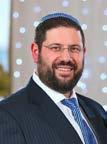
What is the significance of raising an Israeli flag, inside and outside of Israel’s borders? This past week, on the streets of Manhattan, I connected with the miracle of Am Yisrael and Medinat Yisrael from a new perspective while gaining a newfound appreciation for the Israeli flag.
In this week’s Torah portion we hear Eretz Yisrael described as the Land flowing of milk and honey, Eretz zavat chalav u'dvash. Despite making aliyah 38 years ago, Israel still takes my breath away, and I remain grateful for every reminder of how fortunate I am to call this precious Land my home. I was acutely aware of this zechut when walking the streets of Manhattan, together with my wife and the OU team, as we joined 40,000 marchers at the annual Israel Day Parade.
Although I spent the first nine years of my childhood in the United States and heard my parents talk about marching in the parade with their schools, this was the first time I participated in the Israel Day Parade, and my only point of reference was the rikud degalim that takes place every year on Yom Yerushalayim. But as we marched from 55th Street to 75th street my wife and I couldn’t help but notice the differences.
During the rikud degalim on Yom Yerushalayim the streets are filled with marchers. There are only a few designated areas for bystanders as everyone is
encouraged to join. In contrast, reports following the parade noted there were “tens of thousands” of onlookers. We noticed the people standing behind the barricades and asked a friend to explain. He shared that parents with kids in multiple schools choose to cheer on their children as they pass by, rather than march with a specific institution. He also pointed out the non-Jews who joined us in celebrating the 75th anniversary of the State of Israel, waving Israeli flags from the sidelines, and I was tempted to ask each one about their connection to Israel. Unfortunately I didn’t have time.
Seeing the diverse crowds filled me with pride. We are a nation that supports one another - and welcomes foreigners - regardless of physical, socioeconomic, religious or political distance. Jews in the Diaspora could simply choose to celebrate Israel when visiting the country. And yet, Jews flooded the streets of Manhattan, which were decked out in blue and white paraphernalia, celebrating the miracle of
May the learning from this issue of Torah Tidbits serve as an יוליע for the הרוהט המשנ of our dear son
Franky Ehrenberg
on his 20th
Eretz Yisrael for all to see.






There were a few elements of the day that made me miss Medinat Yisrael dearly and count down the minutes to my return flight. Chief among them, my wife and I were struck by the realization that unlike the rikud degalim, we would not end our parade at the Kotel where we could thank HaShem for the gift of Eretz Yisrael, next to Har HaBayit, the holiest place on earth. Instead, we ended the parade in a nondescript section on Madison Avenue.
I was also shocked to see Palestinian protesters on the sidelines, which served as a sobering reminder of the reality Am Yisrael faces in Galut. I left the parade with a better understanding of the acute need for programs such as OU’s JLIC that teach students how to fight antisemitism and misinformation.
Before I bring up my final reflection of the day, I’ll preface with the following story. A few years ago I was interviewed by an Israeli newspaper and we played a game of word association. The reporter said the name of an Israeli politician that I personally did not agree with - on many levels. However, I highlighted the fact that whenever he was outside of Israel’s borders, he used his platform to share the beauty of the Land and his love for the
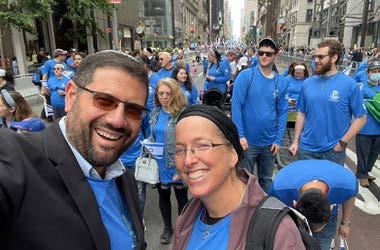
people, spreading a shem tov wherever he traveled.
I find this story especially relevant as we learn about the meraglim in this week’s parsha and see the impact of the lashon hara they spoke about Eretz Yisrael. The Israel Day Parade - celebrated on the streets of Manhattan - is a powerful day for Jews in the Diaspora as they reconnect with Medinat Yisrael and Klal Yisrael.
During the parade I was disappointed to see a gathering of Israelis protesting the government. While I understand such activities stem from pain and fear, and I recognize there is value in standing up for what we believe is right, I felt saddened to see Jews use the Israel Day Parade as their platform for political protest. Especially when doing so outside of Israel’s borders where the nuances of our politics are easily misunderstood and at times used as fuel for hatred. As I drew near, I davened that the shouts of the protesters did not dampen the pride I had hoped participants felt in the mass gathering of Am Yisrael on the streets of Madison Avenue with our blue and white flags waving in the wind.
Just as the crowds disbanded, my heart was uplifted hearing people sing, Eretz
We mourn the passing of Marta Wise z"l
on ג"פשת רייא ח"כ
A woman of chesed who dedicated her life to her family, Am Yisrael and Holocaust remembrance. She will be sorely missed by husband, Harold Wise and family
zavat chalav u’dvash. Fortunately my wife and I knew we would be returning home just days later. But for Diaspora Jews who do not yet have this zechut, I remain empowered and inspired by their ongoing commitment to maintain their connection and alignment with Eretz Yisrael. We truly are a remarkable people, filled with all types of Jews, with supporters around the world. I am grateful for the opportunity to celebrate the elements that unify us - that of being the children of the Borei Olam, fortunate to call Israel home.
I wish a tremendous yasher koach to Yoni Cohen, OU’s Chief of Staff, for all that he does including putting together the packages, t-shirts, banners, and OU paraphernalia that allowed us to walk together and march among the masses.
Wishing you all an uplifting and inspiring Shabbat, Rabbi
Avi Berman Executive Director, OU Israel aberman@ouisrael.org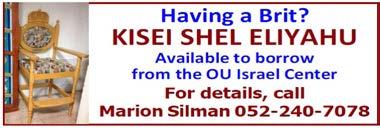
May the Torah learning in this issue be in loving memory of and
Zvi Tyberg z"l on his 25th Yahrzeit Tyberg Family

but you could possibly do them. For when it comes to communications from G-d, you are unique, irreplaceable, sui generis, one of a kind.
This exchange presents a fundamental principle of the Torah: that G-d speaks to Moshe in a way that He does not, nor will He in the future ever do again with anyone else. When Moshe says that people come to him seeking G-d, what he means is: I have access to G-d. He speaks to me. (Speaking to G-d isn’t the trick; the trick is when He answers back.) Similarly, when Moshe says that he teaches G-d’s law, what he means is that G-d communicates those laws to him and to no one else.
This could very well be the prime purpose of this Yitro story. For, in the very next story, the giving of the Torah, the very same theme of Moshe’s uniqueness as the one to whom G-d speaks is central.
3rd aliya (18:24-27) Moshe heard. He chose judges, with only the most difficult cases brought to him. Moshe sent Yitro home.

It takes an honest leader to accept suggestions to improve. Moshe displays his honesty and humility – if the suggestion is good, embrace it. Just as Yitro accepted the news of the Exodus and affirmed One G-d,

kerenmalki.org

02-567-0602



Keren Malki empowers families of children with special needs in Israel to choose home care. Donations are tax-approved in Israel, US and UK.


Honoring the memory of Malka Chana Roth ד”יה 1985-2001, killed in the Sbarro bombing.


The story of the spies abruptly interrupted the march of Jewish history from Egypt to Eretz Yisrael. Eretz Yisrael is the land that Avraham recognized on his own as the land of spiritual opportunity with its rarefied atmosphere, avira d’Eretz Yisrael. It is the land that is the object of Hashem’s particular focus and involvement. It is where we come from, where we belong, where we can thrive, and where we find our connection to G-d. It is the land of our destiny, and the journey there from Egypt was to be direct and speedy, pausing only to receive the Torah at Sinai. But we lost our way. We questioned whether the destination – our destiny –was right for us. We questioned whether we could thrive there and whether we could succeed in getting there. It seems so absurd that we as a people could become so disconnected from both our past and our future, but we did. And it led to the most fitting consequence: we were doomed to spend a generation wandering in the desert, biding our time with no clear direction at all. The anniversary of this occasion is commemorated every Tisha B’Av. On
Tisha B’av, we mourn this event along with the destruction of both Temples, as well as every other tragedy of Jewish history. Evidently, they are all one story that repeats itself. At each of those times we disconnected from our past and from our future, we lost sight of our purpose and our destiny, and ultimately, we became aimless wanderers. This should not be one of those times. We in our time have been blessed to witness the transformation from destruction to rebirth, from the horrific devastation of the Holocaust to the restoration of Eretz Yisrael as the home of the Jewish people and the wellspring of the regeneration of Torah worldwide. To us, the irrevocable destiny of the Jewish people – chosen by G-d to be given His Torah and settled in the Holy Land – is patently clear. And while the world denies it, and while far too many of our brothers and sisters fail to recognize it, we will never again lose sight of it. We must not lose our way and be left again to wander aimlessly off the path of our destiny.
We are thankful for the privilege of this awareness which will give each of us the clarity to withstand the challenges that surround us from all sides and to move forward with clarity to our shared destiny as Klal Yisrael.

ENGLISH SPEAKING LAW FIRM

Orit Madar,Adv Family Law and Mediation Divorce, Child support, Custody Inheritance & Wills
Yariv Madar, Adv. Bodily Injuries, Medical Malpractice Civil Litigation
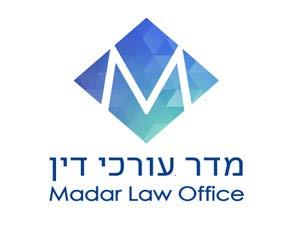
10 Hillel St., Jerusalem | 36 Dam hamkabim st., Modiin 02-6255592, 050-3202909 Madar@netvision.net.il
BEAUTIFUL BAKA FAMILY HOME FOR SALE
186 SQM SPLIT-LEVEL HOME WITH 80 SQM BALCONIES
6 BDRMS, 3 FULL BATHROOMS, 2ND FLOOR, UNDERGROUND PARKING, STORAGE, EXCELLENT CONDITION, CHURCHLAND UNTIL 2077 ASKING PRICE: NIS 6,000,000
LIVE IN A NEW BUILDING DOWNTOWN!
FOR RENT IN A NEW BUILDING ON AGRIPAS ST #6 AND #8 NEXT TO KING GEORGE
UNIQUE 2-ROOM APTS WITH ROUND BALCONY , 1ST AND 5TH FL, 60 SQM- 6900 NIS
3-ROOM APT 7TH FL, 70 SQM - 7800 NIS
4-ROOM APT, 1ST FLOOR, 102 SQM, CORNER APT
2 BALCONIES - 8700 NIS
APTS ARE ALL BEAUTIFUL, BRAND-NEW WITH BALCONIES, UNDERFLOOR HEATING, A/C, 2 ELEVATORS (ONE SHABBAT), OPTION TO FURNISH IF NEEDED

Ilana Nelson 054.5341403
www.integrityrealestate.co.il

2,3,4,


1st aliya (Bamidbar 13:1-20)
Moshe is instructed to send leaders, 1 per tribe, to tour the Land. The leader’s names are listed. They are to travel from the Negev to the mountainous area. To see the Land, the people, the cities and the fertility: assess them and bring back produce.While the march to the Land of Israel began fitfully in last week’s parsha, in these verses the entry to the Land is imminent. And, really, has begun. The spies will be the first Jews to enter the Land intending to live there since Yaakov did hundreds of years earlier. The sending of the spies, while beginning innocuously enough, will become one of the pillar stories of the Torah; the story of national failure.
2nd aliya (13:21-14:7) So travel
they did; entering from the south, traveling north to Hevron, where descendants of the giants lived. They gathered grapes, pomegranates and figs, returning after 40 days, reporting to Moshe, Aharon and the people, showing them the fruits. They said: it is a Land of milk and honey. The people are strong, cities heavily fortified, and we saw giants. Many nations dwell there, including
Amalek. Calev interrupted: Let’s go and take this Land, we can do it. The others answered: no, we can’t. They slandered the Land, offering that we are grasshoppers in the eyes of the people of the Land. The people challenged Moshe and Aharon: better that we had died in Egypt or here in the desert rather than die trying to take the Land. Moshe and Aharon are despondent, ripping their clothes. Yehoshua said: The Land is very very good.The plan derails. And fast. You asked us to scout the Land: it is lush. The people: giants. The cities: fortified. The fertility: huge fruits. The people are understandably afraid; everything is bigger than us. Including the plan to march in and take this Land; it too is too big for us. While Calev and Yehoshua try to swing the momentum positively Moshe and Aharon act as mourners. G-d has stretched His hand: promised the Land to Avraham, pulled us out of Egypt, reached for us at Sinai, stretched a hand to us in inviting us to the Mishkan, planted Himself in the midst of our camp. And to His outstretched arm – we pull away? Moshe and Aharon are devastated. He is doing this all for you: and you refuse?
3rd aliya (14:8-25) Yehoshua said: if G-d wants, He will bring us there. But do not rebel against Him. The people wanted to stone him. G-d said to Moshe: how long will these people annoy me, after all the miracles I have done? I will wipe them out and make you a great nation. Moshe countered: You can’t do that. It will look like You lack the power to bring them into the Land. Gird Yourself, God, and be merciful. G-d said: I forgive them as you have said. But. These people, witnesses to all the miracles who
and our next step will be to plant a fruit tree. I never thought of myself as being the agricultural type, but the feeling of settling and planting a portion of Eretz Yisrael, has been truly euphoric. Iy”H, when we plant our tree, and eat the fruits that will grow one day, I think we will be able to truly appreciate that unique Kedusha found in the fruit of Eretz Yisrael!
now balk; they will not enter the Land, save Calev and Yehoshua.This story of the spies is one of the 2 national failures of the Torah, right beside the golden calf. In fact, G-d’s response here is almost identical to His response there: let Me wipe them out and make you Moshe the new nation. And Moshe’s response here too is identical to there: to do that will mislead the people into thinking that You are unable to follow through and bring the people to the Land. Moshe pleads: G-d relents. This is not the story of failure: it is the story of forgiveness. Just as the story of the golden calf is a story of forgiveness. The more profound the failure, the more loving the forgiveness.Most crucially, this exchange between Moshe and G-d is a glimpse beyond the veil. And that is the powerful meaning of the story. Because we are now embarking on Jewish history, marching to the Land. The beginning of thousands of years of Jewish history. And in preparation for this march, the Torah has outlined in great detail that G-d is in our midst. So, everything should work out just right: guided by His cloud. Yet, Jewish history will be replete with fabulous successes and tragic failures. The trek will be one of peaks and valleys, fits and starts, building and terrible destruction. How are we to understand His ways? With G-d in our midst, should it not be working out better than it is? Oh, that we could peak behind the veil and know His ways.And that is this story. This story is the peak behind the veil. G-d wants to destroy us. Moshe pleads. We are saved. This is the story of what could have been but wasn’t. Does 40 years in the desert seem harsh? Well, not when juxtaposed to the destruction of the entire people.
To conclude, when you buy your Tu B'shvat fruit this year, don’t search for those dried apricots and banana chips imported from Turkey. Rather, head over to the fresh produce and buy yourself some nice juicy Kedusha-filled Jaffa oranges and thank Hashem for bringing you to this land in order to be able to הבוטמ עבשלו הירפמ לוכאל, imbibing that Kedusha in every bite that you take!!
Eiferman
JERUSALEM SALES
SHAAREI CHESSED / RECHAVIA
*Stunning Duplex! 5 bdrms (2 en suite) 25 sqm kitchen, succah, 2 parking, storage.
*Renovated 110 sqm 3 bdrms, 1st floor, succah.
*Beautiful 3 bdrm apt + 50 sqm succah balcony, shabbat elevator, parking and view.
*New 228 sqm duplex penthouse, 30 sqm succah balcony, shabbat elevator, parking and a view.
TALBIEH all on private land
*Renovated 3 bdrms, 130 sqm, succah, elevator, storage room, parking!
*Magnificent 250 sqm + 200 sqm garden.
OLD KATAMON
New 160 sqm 4 bdrms, garden, storage, parking, close to Shteblach. Occupancy - 1.5 years.
TALPIOT
4 rms, balcony, elevator, machsan, parking, view.
NACHLAOT
2 rms, priv entr, storage room, NIS 2,210,000
HAR NOF -New exclusive listing!
Central! 4 bdrms incl. 2 en suite, Pesach kitchen entrance level, option for separate unit/office.
OLD KATAMON RENTAL
3 bdrms including MB en suite, succah, parking.
FOR MANY MORE PROPERTIES: 02-651-4030


We see 40 years as bad. No, no, no. 40 years is generosity. Forgiveness. Mercy. Love.We must be oh so careful to not conclude that we can surmise the Divine way. This story teaches us: we never know what could have been, what may have been. It could have been the destruction of our people. But it wasn’t; it was only a 40-year delay.
4th aliya (14:26-15:7) G-d told Moshe and Aharon to tell the people: As you have said, so will it be. You will not enter the Land. You all will die in the desert. Your children will enter the Land. The number of days you toured will be the number of years in the desert, 40 years. The people mourned. They attempted to rectify their error by arising early to now journey, but Moshe warned them that G-d is not with them. They suffered defeat. Moshe instructed: when you settle in the Land and bring offerings, bring flour, oil and wine with the offerings. This will be pleasing to G-d. While the people are told that they will all die in the desert, they are also told they will enter the Land. Well, not them, but their children. That is the crucial element of this story: the commitment of G-d to His people is unchanged. His plan was merely delayed. This is the story of love of G-d for His people. While the timetable has been altered, the commitment He has made to bring us to the Land is in full force.
5th aliya (15:8-16) A bull offering’s flour, oil and wine amounts are higher than for sheep. Everyone brings these similar libations: one law for all.This very short aliya is a continuation of the previous aliya in which the flour, oil and wine amounts are
given for offerings of sheep or rams. The previous aliya did not want to end with the tragedy of the story of the spies. Instead, it ended with the phrase “a pleasing aroma to G-d”. In fact, this description of the libations is encouragement. You will make it to the Land. And you will bring offerings there. You will bring flour, oil and wine that accompany the offerings. Those things are the finest of the produce of the Land. On the heels of the sentence of 40 years in the desert is the promise that you will harvest wheat, olives and grapes in your Land. You may be suffering now due to this terrible sin of the spies. But good times await you. And I, G-d says, want you to approach Me with your full noble station of life: your fine flour, finest olive oil and the joy of wine.
6th aliya (15:17-26) Upon entering the Land, the mitzvah of taking challa from bread dough begins. If an error is made and the entire people accidentally sin as a result, a sin offering of a bull is brought. Atonement is granted as the people sinned accidentally. The post spies encouragement continues. You will enter the Land. And you will have bread, not manna. In the midst of a crisis, it is hard to imagine the smoke clearing. But it does. And it will. You personally will not make it to the Land; but the Jewish people will. Additionally, this sin that occurred, this national sin has been punished harshly with 40 years in the desert. But national sins will happen and will be forgiven; not by national exile but by a mere offering of a bull. Of course, that requires admitting the sin. When you are contrite, G-d says, I am there to grant forgiveness.
7th aliya (15:27-41) A chatat offering atones for an accidental sin. However, the soul is cut off for one who blasphemes G-d. A person was found chopping wood on Shabbat. He was sequestered, as Moshe and Aharon did not know what to do with him. They were told he was to be put to death. Place tzitzit on the corners of your garment as a reminder to do all the mitzvot and be holy to Me.The encouragement of the post spies failure continues. Not all sins are created equal. Sins are forgiven through a sin offering. Others are much more serious. Blasphemy is a rejection of the very root of all of Jewish existence; that we are marching through life with our G-d. Shabbat violation too; it is a sign of our covenantal relationship, that G-d and the Jewish people have a special relationship. Though Shabbat is mentioned quite a number of times in the Torah, this little story reverberates until our own time. We continue to describe one who is loyal to Torah and Mitzvot as a Shomer Shabbat. As if to say, “Shomer Shabbat? That says it all.”
The Torah portion discusses the twelve spies that were sent by Moshe to explore the Holy Land. We fast forward in our haftorah to the story of the spies that Yehoshua sent to scout the city of Yericho, prior to the Jewish people’s invasion of the Land.
The two spies arrive in Yericho and lodged at an inn operated by a woman named Rachav. When their presence is made known, she hides her guests and protects

them from the king. She actually hid them on her rooftop.
The two spies assure her that they will protect her and her family when the Israelites enter and conquer the Land. She is to place a scarlet thread in the window as a sign that her home is a place of safe haven.
The haftorah then dramatically describes Rachav providing a way for the men to safely escape. The men are able to grab onto a rope and lower themselves from her window. The spies are successful in exiting the city and return to Yehoshua with their report.

37th of the 54 sedras; 4th of 10 in Bamidbar
Written on 198 lines, ranks 25th
10 Parshiyot; 7 open, 3 closed
119 p'sukim, ranks 21st, 6th in Bamidbar
1540 words, ranks 27th, 5th in Bamidbar
5820 letters, ranks 27th, 4th in Bamidbar
Shelach has shorter than average p'sukim, which explains the drop in rank for words and letters, yet the rise in rank within Bamidbar indicates that there are sedras with even shorter p'sukim.
3 mitzvot: 2 positives - Challah & Tzitzit, 1 prohibition - not to follow the temptations of your heart and eyes.
As we point out often, the distribution of mitzvot in the Torah is very uneven. With only 3 mitzvot, there are 25 sedras with fewer mitzvot than Shelach and 26 with more. 3 is the median number of mitzvot per sedra in the Torah. T'ruma and Chukat also have 3 mitzvot each.
& STEFAN SOMOGYI AND FAMILY ON THE MARRIAGE OF THEIR GRANDSON

Rehavia 4R, 100 SQM, 7th floor, shabbat elevator, parking, storage, views to park & Knesset! #050-7225694
German Colony Cottage, new, 5R, 150 SQM, 100 SQM garden, private entrance, parking. #052-6503348

City Center Penthouse, duplex, 9R, 340 SQM, 2 terraces, renovated, parking. #052-6984466

 BY RABBI CHANOCH YERES R av, Beit Knesset Beit Yisrael, Yemin Moshe
BY RABBI CHANOCH YERES R av, Beit Knesset Beit Yisrael, Yemin Moshe

"BUT the people that dwell in the land are fierce."
Nachmanides is bothered about the significance of the word "BUT" or EFES in Hebrew.
He answers that the Hebrew term "EFES" denotes utter impossibility. This one phrase revealed the grave offense of the spies. Had they simply responded by saying that the people of the country were mighty, and the cities fortified, they would have been stating a fact, and thereby discharging their duty. Their obligation was only to report the advantages and the disadvantages that existed in the Land.
However, using that one word "EFES", in describing the strength of the people guarding the Land, they expressed their own opinion and verdict- in essence claiming that this was a task beyond the Israelites' power to conquer the Land.
Shabbat Shalom
foltaught for who of and happiness. it a


RASKO - large 4 rooms + separate unit, elevator, balcony, good shape, 3 directions, parking, quiet. 3,450,000 NIS
OLD KATAMON IN A GREEN AREA - large 3 rooms, 95m, in a small new building, Shabbat elevator, sukkah balcony, master bedroom, parking, Rare! 4,600,000 NIS
GERMAN COLONY - Nice 4 rooms, in a luxury building, Shabbat elevator, sukkah balcony, master bedroom, parking, view, quiet.

KIRYAT SHMUEL - Penthouse, 5 rooms, small building with accessibility, elevator, terrace, 30m, master bedroom, for renovation, parking, rare!
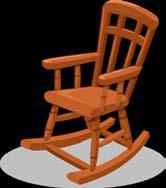


It may not sound like much of a story to you, but to me it was meaningful at many levels. I've heard the story three times now, each time from a different person. Each of the three went through a remarkably similar experience and shared their story with me. I'd like to share the story with you, but some background will be necessary. You must already have guessed that the background will derive from this week's Torah portion, Parshat Shelach (Numbers 13:1-15:41). At the very end of the parsha, we read:
"The Lord said to Moses, as follows: Speak to the people of Israel and instruct them to make for themselves fringes on the corners of their garments throughout
all their generations; let them attach a cord of blue to the fringe at each corner. That shall be your fringe; look at it and recall all the commandments of the Lord and observe them, so that you do not follow your heart and eyes… Thus you shall be reminded to observe all My commandments and to be holy to your God…" (Numbers 15:37-40).
The Torah's word for "fringes" is tzitzit. This mitzvah is punctiliously kept by observant Jews to this very day, consistent with the verse's insistence that it is a practice mandated for "all their generations." The mitzvah entails affixing strings to four cornered garments, so that the strings hang loose. Jewish men wear these garments, and the stringent view, codified by the Shulchan Aruch (Orach Chaim 8:11), requires that the garment be worn above one's other clothing "so that one will constantly look at the tzitzit and thereby remember the commandments."
More lenient views allow the garment to
be worn under one's other clothing, but still encourage the practice of letting the strings themselves protrude from one's clothing so that the wearer can see them, reflect upon them, and call to mind the Almighty's commandments. This is the practice of very many observant Jews nowadays.


Now we come to the story told to me by three young men who had identical experiences with these strings while wearing them in their everyday business settings. To my knowledge, these three men do not know each other and indeed dwell and work in communities geographically distant from each other.




Each of them approached me with his story, convinced that I would be especially interested in what had occurred to them. Each of them was approached, and I should emphasize respectfully approached, by a non-Jew, and each of them was asked if there was any significance to the strings protruding from their sweaters or shirts. Each of them replied that the strings had religious significance and that they wore them in keeping with a biblical command.
Each of them was surprised when the non-Jew immediately understood that this practice traced back to the Bible; in his words, to the Old Testament. Two of them even knew the chapter and verse of the passage in the Bible, quoted above. "Of course," they said, "these strings are the 'fringes' which must be attached to your garments."
All three "storytellers" were similarly taken aback by the expertise shown by their non-Jewish acquaintances and by their familiarity with "our" Bible. But none of the three stories ends quite here.



All of the three non-Jews then persisted to ask, "But where are the blue strings? Doesn't the Bible prescribe that a blue cord be attached at each corner? Where are your blue cords?"
The Torah's word for the "blue cord" is tekhelet. In Biblical times, and for centuries thereafter, one of the cords, and according to some opinions two of them, were dyed blue before being attached to the fourcornered garment. The dye was extracted from a sea creature known as the chilazon. Over the course of Jewish history, this practice was discontinued. It became difficult to procure this specific dye, and eventually the precise identity of this sea creature became unknown.
Two of my "storytellers" were able to share the reason for the absence of the blue cord with their non-Jewish questioners.
One had to simply admit that he did not know why he did not keep the precise biblical command in his personal practice.
Permit me now to briefly tell you another story; namely, the story of the discovery of the identity of the sea creature, the recovery of the knowledge necessary to extract the dye from that creature, and the renewed ability to observe this mitzvah exactly as prescribed by the Torah, in the portion we read this Shabbat. The story begins in the late 19th century with the efforts of Rabbi Gershon Henoch Leiner to travel to the museums and aquariums of the Mediterranean coast in search of the chilazon. He identified the creature as a subspecies of a squid, and his followers to this day derive the blue dye from this creature and color their tzitzit with it. However, rabbinic authorities of that time disagreed with this rabbi's opinion.
Closer to our time, the late Chief Rabbi of Israel, Rabbi Isaac Herzog, wrote his doctoral thesis on the topic of the identification of this sea creature and brilliantly defended his thesis: The chilazon was not a type of squid, but was rather a type of snail, known scientifically as the murex trunculus.
Even closer to our time, barely two decades ago, a group of Israeli scholars found a source in the ocean near Israel for this snail, and through a fascinating process too long to describe here, began to produce the dye and made tzitizit dyed blue available to the public. Nevertheless, a great number of rabbinic scholars remain unimpressed by these discoveries.
For a full description of this entire topic, one should consult the following website:

What was my response to the three "storytellers" and their tale? I chose not to share with them my own private reflection to the effect that had these three non-Jews met me, they would have found the blue cord of which they were informed by their own biblical study. Rather, I chose to share with the storytellers one of the explanations given for the blue cord.
This explanation is to be found in a book entitled Sefer HaChinuch, written by a medieval rabbi whose identity is uncertain. The book is an enumeration of all 613 Torah commandments, with an explanation given about the "root" of each command. By "root" he means, in contemporary terminology, the symbolic significance of the commandment. Here is what the author writes, in my own admittedly free translation:
"The underlying reason for this mitzvah is apparent. What can be a better reminder of God's commandments than an appendage attached to one's everyday apparel? But more than that, let us analyze the colors of the cords: blue and white. White is symbolic of the body, which our tradition (see Pirkei D'Rabbi Eliezer 3) teaches us was primordially created from the snow, which is white. Note too, that the body in its early embryonic stage resembles intertwined cords or strings (see Tractate Niddah 25b). The blue cord is reminiscent of the blue sky, of heaven, and is symbolic of all that is spiritual about mankind. Therefore, the blue cord is wound around the white to emphasize that ultimately, the soul is above, and the body is below; the soul is primary, and the

For those of us who wear tekhelet nowadays, and I am proud that I am among them, a powerful image that comes to our mind's eye every time we gaze upon our tzitzit is the image of a blue cord wound around a white one, and it is a constant reminder that our "white body" is best enveloped by our "blue soul," that our earthly selves must be subservient to our heavenly spirit.
Will the beautiful explanation given by the Sefer HaChinuch convince those who do not yet wear tekhelet to begin to do so? Perhaps not. But perhaps you, dear reader, with the addition of so many similar rabbinic passages available on the tekhelet. com website, will be convinced to add this new spiritual dimension to this important everyday mitzvah.
May the learning of these Divrei Torah be תמשנ יוליעל HaRav Ya'akov Zvi ben David Arieh zt"l
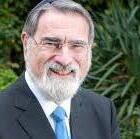
Canaanites, Perrizites, Jebusites and other minor kingdoms that they would have to confront in conquering the land. Nor was this an ancient memory. It had happened not much more than a year before.
One of the most powerful addresses I ever heard was given by the Lubavitcher Rebbe, Rabbi Menachem Mendel Schneerson, on this week’s parsha, the story of the spies. For me, it was nothing less than life-changing.
He asked the obvious questions. How could ten of the spies have come back with a demoralising, defeatist report? How could they say, we cannot win, the people are stronger than us, their cities are well fortified, they are giants and we are grasshoppers?
They had seen with their own eyes how God had sent a series of plagues that brought Egypt, the strongest and longest-lived of all the empires of the ancient world, to its knees. They had seen the Egyptian army with its cutting-edge military technology, the horse-drawn chariot, drown in the Reed Sea while the Israelites passed through it on dry land. Egypt was far stronger than the
What is more, they already knew that, far from being giants confronting grasshoppers, the people of the land were terrified of the Israelites. They had said so themselves in the course of singing the Song at the Sea:
"The peoples have heard; they tremble; Pangs have seized the inhabitants of Philistia. Now are the chiefs of Edom dismayed; Trembling seizes the leaders of Moab; All the inhabitants of Canaan have melted away. Terror and dread fall upon them; Because of the greatness of your arm, they are still as a stone." (Ex. 15:14-16)
The people of the land were afraid of the Israelites. Why then were the spies afraid of them?
What is more, continued the Rebbe, the spies were not people plucked at random from among the population. The Torah states that they were “all of them men who were heads of the people of Israel.” They were leaders. They were not people given lightly to fear.
The questions are straightforward, but
the answer the Rebbe gave was utterly unexpected. The spies were not afraid of failure, he said. They were afraid of success.
What was their situation now? They were eating manna from heaven. They were drinking water from a miraculous well. They were surrounded by Clouds of Glory. They were camped around the Sanctuary. They were in continuous contact with the Shechinah. Never had a people lived so close to God.
What would be their situation if they entered the land? They would have to fight battles, maintain an army, create an economy, farm the land, worry about whether there would be enough rain to produce a crop, and all the other thousand distractions that come from living in the world. What would happen to their closeness to God? They would be preoccupied with mundane and material pursuits. Here they could spend their entire lives learning Torah, lit by the radiance of the Divine. There they would be no more than one more nation in a world of nations, with the same kind of economic, social and political problems that every nation has to deal with.
The spies were not afraid of failure. They were afraid of success. Their mistake was the mistake of very holy men. They wanted to spend their lives in the closest possible proximity to God. What they did not understand was that God seeks, in the Hasidic phrase, “a dwelling in the lower worlds”. One of the great differences between Judaism and other religions is that while others seek to lift people to heaven, Judaism seeks to bring heaven down to earth.
Jerusalem Real Estate is My Business

Eta: 054-723-3863 Rachel: 052-546-6425
Amazing stand alone homes in OLD KATAMON, TALBIYA, BAKA, GERMAN COLONY

OLD KATAMON 80 sqm with 2 bedrooms and 2 bathrooms, one flight up with elevator. Completely renovated with terrace that opens into a sukka. Full of light & surrounded by greenery. Very quiet Price 4,200,000 NIS
Fantastic opportunity to buy 170 sqm on one floor, with sukka terrace, Shabbat elevator, brand new apt ready in 2 years. Only 6,500,000 NIS.

In GERMAN COLONY, 140 sqm on one floor, 2nd floor walk up, completely renovated with 4 bedrooms and 2 full bathrooms. Large sukka terrace.
7,100,000 NIS
In BAKA, most sought out location. New apartment duplex of 236 sqm plus 81 sqm of outdoor space. Plus parking. For more info call Eta: 0547233863
Fantastic garden apartment for sale on Lupo Street. ARNONA. 175 sqm 6 rooms 4 bedrooms and 3.5 baths. Extra office downstairs. 60 sqm garden. Storage room. Parking. 8,900,000 NIS

FOR RENT: Shai Agnon 140 sqm apt, one floor, 4 beds, 2 full baths, terrace, 2 elevators, 2 parking. From August 15. Furnished, 1 year rental. 14,500 NIS/mo


Eta Morris Realty, Ltd.

etamorrisrealestate@gmail.com
Eta: 054-723-3863 · Rachel: 052-546-6425
etamorrisrealty.co.il
Much of Torah is about things not conventionally seen as religious at all: labour relations, agriculture, welfare provisions, loans and debts, land ownership and so on. It is not difficult to have an intense religious experience in the desert, or in a monastic retreat, or in an ashram. Most religions have holy places and holy people who live far removed from the stresses and strains of everyday life. There was one such Jewish sect in Qumran, known to us through the Dead Sea Scrolls, and there were certainly others. About this there is nothing unusual at all.
But that is not the Jewish project, the Jewish mission. God wanted the Israelites to create a model society where human beings were not treated as slaves, where rulers were not worshipped as demigods, where human dignity was respected,
077-2050015
052-2678749
golanechasim@gmail.com
RASCO: new 4 room apartment, 95m, master suite, elevator, balcony, very nice view 2,950,000 NIS
ARNONA: 4-room apartment, 90m, beautifully renovated, master suite, balcony, storage, Shabbat elevator, private parking 3,250,000 NIS
BAKA: New 4 room apartment in a new building, 88m, master suite, storage, Shabbat elevator, private parking, 3,950,000 NIS


RECHAVIA: 4-room apartment, 92m, Suka balcony, Shabbat elevator, fully accessible, private parking, storage 4,400,000 NIS
ARNONA: 5-room apartment, 120m, balcony, elevator, fully accessible, private parking, storage 4,350,000 NIS
BAKA: 5-room garden apartment, 140m, master suite private parking, storage, full of light, nice garden, 6,000,000 NIS
OLD KATAMON: Spacious new 5-room apartment, 140m, terrace, underfloor heating, Shabbat elevator, 2 parking, 6,300,000 NIS
FOR RENT:BAKA: nice 4-room apartment, 82m, beautifully renovated, master suite, air conditioners, balcony, second floor, elevator - fully accessible, storage, 8,000 NIS
where law was impartially administered to rich and poor alike, where no one was destitute, no one was abandoned to isolation, no one was above the law and no realm of life was a morality-free zone. That requires a society, and a society needs a land. It requires an economy, an army, fields and flocks, labour and enterprise. All these, in Judaism, become ways of bringing the Shechinah into the shared spaces of our collective life.
The spies feared success, not failure. It was the mistake of deeply religious men. But it was a mistake.
That is the spiritual challenge of the greatest event in two thousand years of Jewish history: the return of Jews to the land and state of Israel. Perhaps never before and never since has there been a political movement accompanied by so many dreams as Zionism. For some it was the fulfilment of prophetic visions, for others the secular achievement of people who had decided to take history into their own hands. Some saw it as a Tolstoy-like reconnection with land and soil, others a Nietzschean assertion of will and power. Some saw it as a refuge from European antisemitism, others as the first flowering of messianic redemption. Every Zionist thinker had his or her version of utopia, and to a remarkable degree they all came to pass.
But Israel always was something simpler and more basic. Jews have known virtually every fate and circumstance between tragedy and triumph in the almost four thousand years of their history, and they have lived in almost every land on earth. But in all that time there only ever was
one place where they could do what they were called on to do from the dawn of their history: to build their own society in accord with their highest ideals, a society that would be different from their neighbours and become a role model of how a society, an economy, an educational system and the administration of welfare could become vehicles for bringing the Divine Presence down to earth.
It is not difficult to find God in the wilderness, if you do not eat from the labour of your hands, and if you rely on God to fight your battles for you. Ten of the spies, according to the Rebbe, sought to live that way forever. But that, suggested the Rebbe, is not what God wants from us. He wants us to engage with the world. He wants us to heal the sick, feed the hungry, fight injustice with all the power of law, and combat ignorance with universal education. He wants us to show what it is to love the neighbour and the stranger, and say, with Rabbi Akiva, “Beloved is humanity because we are each created in God’s image.”
Jewish spirituality lives in the midst of life itself, the life of society and its institutions. To create it we have to battle with two kinds of fear: fear of failure, and fear of success. Fear of failure is common; fear of success is rarer but no less debilitating. Both come from the reluctance to take risks. Faith is the courage to take risks. It is not certainty; it is the ability to live with uncertainty. It is the ability to hear God saying to us as He said to Abraham, “Walk on ahead of Me” (Gen. 17:1).
The Rebbe lived what he taught. He sent emissaries out to virtually every


NEW Listing! In Lev Rechavia Residence - pool, doorman 24/7, gym, unique 180m on one level, facing the park, succah balcony, very bright DEBORAH - 054-4804767
NEW Listing! Quiet Old Katamon - new 3 rooms Gem, totally renovated, top standard, amazing views to the forest, succah balcony, parking, storage MAYA - 054-6650184
NEW Listing! FOR RENT!!
Luxurious 300m penthouse with private pool on a 200m terrace, panoramic views of Jerusalem
MAYA - 054-6650184
Luxurious apartment in Talbieh - doorman, pool, gym, 177m on one level, 32m terrace, beautiful views to the park, parking, storage
DEBORAH - 054-4804767
Luxurious garden apartment on a small lane of Old Katamon, 340m built on 2 levels, 8 rooms, separate unit with separate entrance, high ceilings, full of charm, very quiet, bright, 130m private garden, top of the line finishes, close to the park
DEBORAH - 054-4804767
On the exquisite Dubnov St. in Talbieh, private 135m cottage, totally renovated with 65m private landscaped garden, views from balconies, a real gem!
MAYA - 054-6650184
New luxurious penthouse in the best Rechavia285m on one level, high end building, beautiful views from succah terraces of 190m, 4 parking spots, storages, 4 exposures, very sunny!!
DEBORAH - 054-4804767
In a small lane in the German Colony - Unique Authentic house of 700m built on a huge plot of 1,200m - perfect for making an apartment building or a tremendous private housePotential to build up to 2,000m
DEBORAH - 054-4804767
Magnificent Authentic private house on a small dead end of Baka- 650m built on 3 levels with huge basement, 750m plot with a wonderful landscaped garden. With a thoughtful layout, an abundance of light and great bones, it is a unique property!
DEBORAH- 054-4804767
In a small lane of the German Colony, Garden apartment with private entrance, 250m with private garden, parking, high ceilings, in an authentic beautiful 3 apartments building MAYA – 054-6650184
place on earth where there were Jews. In so doing, he transformed Jewish life. He knew he was asking his followers to take risks, by going to places where the whole environment would be challenging in many ways, but he had faith in them and in God and in the Jewish mission whose place is in the public square where we share our faith with others and do so in deeply practical ways.
It is challenging to leave the desert and go out into the world with all its trials and temptations, but that is where God wants us to be, bringing His spirit to the way we run an economy, a welfare system, a judiciary, a health service, and an army, healing some of the wounds of the world and bringing, to places often shrouded in darkness, fragments of Divine light.
These weekly teachings from Rabbi Sacks zt”l are part of his ‘Covenant & Conversation’ series on the weekly Torah teaching. With thanks to the Schimmel Family for their generous sponsorship, dedicated in loving memory of Harry (Chaim) Schimmel. Visit www.RabbiSacks.org for more.
המלש האופר
האל היח ןב םייח עשוהי

Efrat and Gush Etzion
www.angelrealty.co.il
For Sale in Efrat
Zayit: * 3 room apt. Large balcony, elevator and p rivate parking. 1,990,000 NIS
* 300 meter cottage, 10 rooms, located bottom of Pitum Haketoret
St. 4,990,000 NIS

* 5 room apt. 130m, 2,690,000 NIS
*The Village – 8 room cottage, 4,700,000 NIS
Dagan: * 5 room apt. 140m, 2,890,000 NIS
*4 room garden apt. 2,590,000 NIS

For Sale in Alon Shvut :

* 5 room apt. 150m, 2,300,000 NIS
Gabi- 0524588716



Over the years of studying this week’s haftarah, a selection taken from the second perek of Yehoshua, we often compared the mission of the spies sent by Yehoshua to the mission sent by Moshe, as we read in the weekly parasha. Clearly, the different outcomes of the two missions led us to analyzing the differences of the purpose and the goal of each mission.
But a very basic question remains unanswered, that being – why would Yehoshua even attempt to send spies at all? Having seen what took place years earlier and fully aware of the near-rebellion against the nation’s leadership and the disastrous result of the false report…why would Yehoshua taken the risk of sending spies once again? Additionally, Moshe sent his agents at Hashem’s command (“al pi Hashem”), whether by direct order or by reluctant acceptance of the people’s desire. But we read of no divine command given to Yehoshua nor even the leader’s request for G-d’s permission!?
So, what was the purpose of “spysending”?
What would it accomplish?
And why take the risk?
There is no question that the clear difference in the missions would have Yehoshua more confident in his belief that his agents would not be fated to sin - as did those of Moshe for, while his teacher and mentor instructed the spies to report on the relative fortifications and strength, Yehoshua told his emissaries to “see the land and Yericho”- requiring no military information that could be exaggerated or falsified. Furthermore, his spies were directed to leave for the mission secretly and return in the same way – reporting to Yehoshua alone (and NOT, as happened in Moshe’s time, to the entire nation), thereby preventing a massive panic from spreading throughout the nation. And, additionally, Yehoshua sent but two individuals to carry out his bidding, far more manageable than the twelve men sent by Moshe.
All these reasons are valid and contribute to the confidence that Yehoshua felt in sending spies. But I believe there is a far

New on the Market - the best part of Har Choma right next to the Community Center, shopping and Shuls. 4 & 3 room apartments with Sukka mirpeset, elevator, parking and storage. 3 room - 2.09m, 4 room 2.49m
New building under construction in Katamonim on the border of Katamon. 2-5 room apartments, starting at 2.1m shekel
Last 2 room apartment + mirpeset & underground parking in new building under construction in a great location. 2.15m shekel. 3 & 4 rooms also available
more essential reason as to why he had little doubt in the success of his mission.
We naturally tend to compare these two spy-stories with each other, forgetting that there was a thirty-nine year gap between the two! There were different leaders, different spies and different missions. More importantly, these events involved two very different generations. In the passing years, Israel had fought and defeated, the Canaanites in the area of Arad (B’Midbar 21: 1-3), they fought and conquered the powerful Amorite states – one led by Sichon and one by Og – and they took over their land (ibid: 24-25; 35). Perhaps even more importantly, we must recall an essential truth of which many of us tend to forget or, perhaps, never knew:
“Vayishlach Moshe lragel et Ya’zer” – “And Moshe sent [men] to spy out Ya’zer…”
(ibid: 32). Yes! Moshe himself sent another contingent of spies – and they were successful! And, crucially, these battles, victories and spy mission all took place in the final year in the desert!
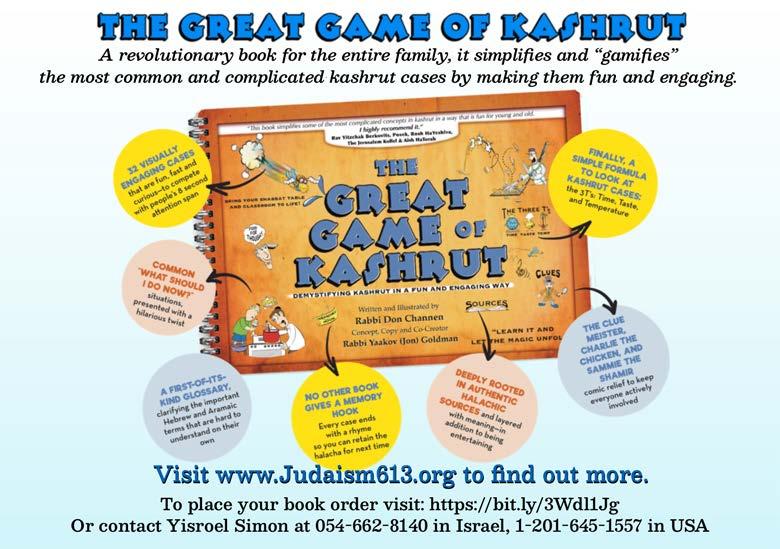
In effect, therefore, Yehoshua’s decision to send spies into Eretz Cana’an was neither rash nor risky. He had much to rely upon: a young generation ready and willing to conquer their promised land, a tried and true army that had just recently scored victories over powerful enemies and a nation fully faithful to the divine promises that had already begun to be fulfilled.
Yehoshua needed no command or “permission” from Hashem to send spies. On the contrary, his deep belief in G-d’s promises made it a simple decision, and it proved to the entire nation that Hashem’s word stands true for all time.
There we saw the giants, the sons of Anak, descended from the giants. In our eyes, we seemed like grasshoppers, and so we were in their eyes. (Bamidbar 13:33).
When the meraglim (spies) return from the Land of Israel and relay to the nation what they witnessed, they include a description of the inhabitants of the Land as being giants. The spies then go on to depict how tiny they felt in the presence of these giants, like little grasshoppers. The next phrase is puzzling. They state: “and so we were in their eyes.” How can the spies speculate as to how they were perceived by the inhabitants of the land of Israel? Rashi citing a gemara in Sota (25.) suggests that the spies overheard the people telling one another: “There are ants in the vineyard who look like people.”
Rabbi Norman Lamm in his sefer Drashot L’Dorot derives a very pertinent lesson from the statement “we seemed

like grasshoppers, and so we were in their eyes.” The Ba’al Haturim citing Chazal, supplies the missing link between the way the spies viewed themselves and the way they felt they were perceived by others. A giant ate a pomegranate and then discarded its shell. The spies then climbed into the shell to seek shelter. What Chazal are seeking to relay through this allegory is that the spies had no selfrespect. They had the inferiority complex that many Jews have in galut (exile). They are willing to accept even a hollow shell emptied and disposed of, with its only value being that it was previously used by a non-Jew.
Throughout the generations Jews often sought to mimic the customs and behaviors of their contemporaries in order to be accepted. Whether it be in the form of dress, speech, names, clubs, the Jew tried to adjust and adapt to the surroundings. They seek an “empty shell” in order to be accepted by their secular neighbors. As Rabbi Lamm so eloquently states: “If man thinks of himself as no more than an insignificant insect, it is the inviolable law of nature that his fellows think of him as being no more than a mere grasshopper.”
The Gemara (Shabbat 31b) states that when a person passes away, one of the questions that Hashem will ask of them is:
“Kavata itim laTorah?” Did you set aside time to study Torah?” But we have, on
occasion, suggested another interpretation. “Did you adjust the times – the norms and influences of the day – to the precepts of the Torah rather than trying to adjust the Torah to fit with the times?” The influence should be from within the Torah environment to the outside world and not the opposite. Some people try to adapt the Torah to modern times. They suggest that we be “open-minded” about contemporary norms and values. We say that, on the contrary, we need to open our minds to accept the Torah and adapt our lives to it.
We must internalize this lesson and ensure that we retain self-respect and reject the shells of strange ideologies thrown to us. We may be enticed by our non-Jewish fellow citizens who seek to persuade us to assimilate within their
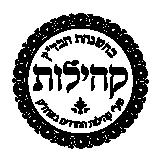
More on this next time.
everyday blessings that most of us take for granted.
personified contrasting character traits. Ahron was a peacemaker, he constantly looked for ways to create harmony among his people. Indeed, he was ready to compromise his own values to achieve this goal, as we see in the story of the sin of the golden calf. Chur, For
The Puah Institute is based in Jerusalem and helps couples from all over the world who are experiencing fertility problems. Offices in Jerusalem, New York, Los Angeles & Paris. Contact (Isr) 02-651-5050 (US) 718-336-0603 www.puahonline.org
culture and/or religion. We must retain our Jewish pride and rich tradition and pass it wholeheartedly to our future generations. It is something to indeed relish.
Fourthly, this time in last week’s Parshat Bo, they each demonstrated Kreaturgefühl, a deep awareness of having been created by the Almighty.
In this week’s Torah portion, two early twentieth century spiritual guides brought two additional characteristics of the “redeemed” individual to our attention.

Premium delicious shabbes meals
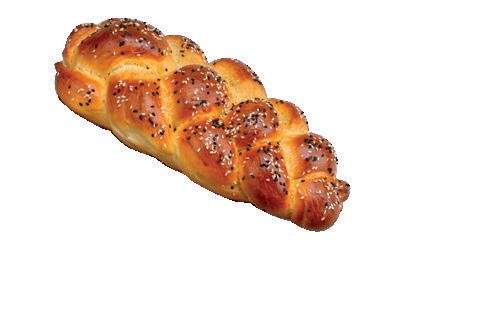


Rabbi Grodzinski taught that the “redeemed” individual does not ignore the prevalence of evil in the world but disdains it and confronts it wisely and successfully.
Openning hours:

Thursday 12 pm-2 am
Friday 8 am-3 pm

And Rabbi Ziv, the Alter, gifted us with the insight that our relationship with the Almighty can be reciprocal. Yes, He is our Savior. But we can reciprocate His salvation by bringing honor to His name by acting ethically and honestly, even in the face of temptation.
As we draw ever closer to the Passover holiday, Chag HaPesach, we now have learned of no less than six paths to redemption, six paths to “seeing ourselves as if we personally were redeemed from Egypt.”
02-9964469 | 054-8777347

Which of the six will you choose as your path? Or will you try your hand at all six?

“Eileh shemot ha’anashim asher shalach Moshe lator et ha’aretz, Vayikra Moshe le’Hoshea bin Nun Yehoshua -These are the names of the men Moshe sent to explore the land, and he gave Hoshea son of Nun the name Yehoshua.” (Bamidbar 13;16) Why is this verse necessary after the Torah just listed the names of the spies? The phrase, “these are the names” seems to carry a specific significance.
A name is the greatest treasure one can ever receive. A person’s name in our physical world parallels the essence of his soul found in heaven. Indeed, the Arizal teaches that when one wants to wake someone up, it is usually sufficient to just mention their name. More than just providing a stimulus to get out of bed, it awakens the inherent soul within. A name also has a direct impact on the trajectory of one’s life. The name Avraham or Sara may influence the bearer of that name to be more inclined toward chessed and righteousness. Rabbi Dovid Hofstadter notes that a child is affected not only by the intrinsic meaning of the name he is given, but also by the personality and character of the person they are named for in addition to the thoughts and intentions of the parents
at the time of naming. Although everyone has free will, our name plays a major role in informing who we will become.
Rabbi Moshe Weinberger relates that he learned a priceless lesson from Rav Pam zt’l about the power of names when he was starting out as a young teacher. Rav Pam asked the group of new rabbeim what they think the most beloved word would be for a teacher to tell his students. Some offered, “recess!” others said, “no homework!” still others said, “summer vacation!” Rav Pam responded, “A child’s name is the most beloved word he can hear.” Calling each student by his name creates a crucial connection and builds the child’s sense of self and worth.
Rav Moshe Wolfson explains that a person’s name is a way of reminding him of his mission in this world. In contrast, angels don’t have one specific name since their tasks are continuously changing. When Yaakov Avinu asked the angel who fought with him to tell him his name, the angel responded, “Why do you ask my name?” Our tradition teaches us that this angel is synonymous with the yetzer hara, whose job is to make sure people don’t ask “what is my name?” meaning, “what is my essence and calling?” When people fail to focus on their mission and their special qualities, the yetzer hara scores a victory. Thus, says Rav Wolfson, the Torah repeats once again, “these are
the names…” to emphasize the directive for these men to focus intently on their mission and relay an accurate report. Interestingly, the Midrash interprets each spies’ name unfavorably after they returned with a negative report of the land. Each person can live up to the greatest levels inherent in their name or unfortunately, can distort or pervert the power given to them in their name.
We now appreciate the compelling advice of the Shelah HaKadosh to recite a passuk at the conclusion of the Shemoneh Esrei that begins with the first letter of one’s name and ends with the last letter of one’s name. The verse that we choose can inspire each one of us as we step away from our communion with Hashem, to focus on our life’s goals and lean into a life with direction, motivation and enthusiasm.

JoinUsforanEveningofCelebration InSupportofTheMichaelLevinBase, aNon-profitthatPhysicallyandEmotionally HelpsLoneSoldiersandLoneB'notSheirut

NormanBlausteinandKathyPoodiackwillbe receivingtheVolunteerAppreciationAward.
EveHarow,directoroftourismandeducationforThe OneIsraelFund,willbeourMasterofCeremony. "FromtheheART"asilentartauction.Created worksbythelonesoldier/loneb'notsheirut communitywillbeondisplayto beauctionedoff.

June 20th 6:00 PM BotanicalGardens
ZalmanShne'ur1,Jerusalem
DONATIONS:
250NISDONOR,360NISSUPPORTER,500NISPATRON BUYHERE: CAUSEMATCH.COM/GALADINNER
CommanderoftheBritishforcesin Afghanistanin2003,headedthe internationalterrorismintelligenceteam andchairmanoftheintelligencegroupin theUKnationalcrisismanagement committee.ColonelKemphasdefended theStateofIsraelanditsarmedforcesat theUnitedNations,TheUSCongress,and theUKParliament.


Lightdairybuffet|MehadrinGushEtzion
Formoreinformation:bonnie@thebase.org.il

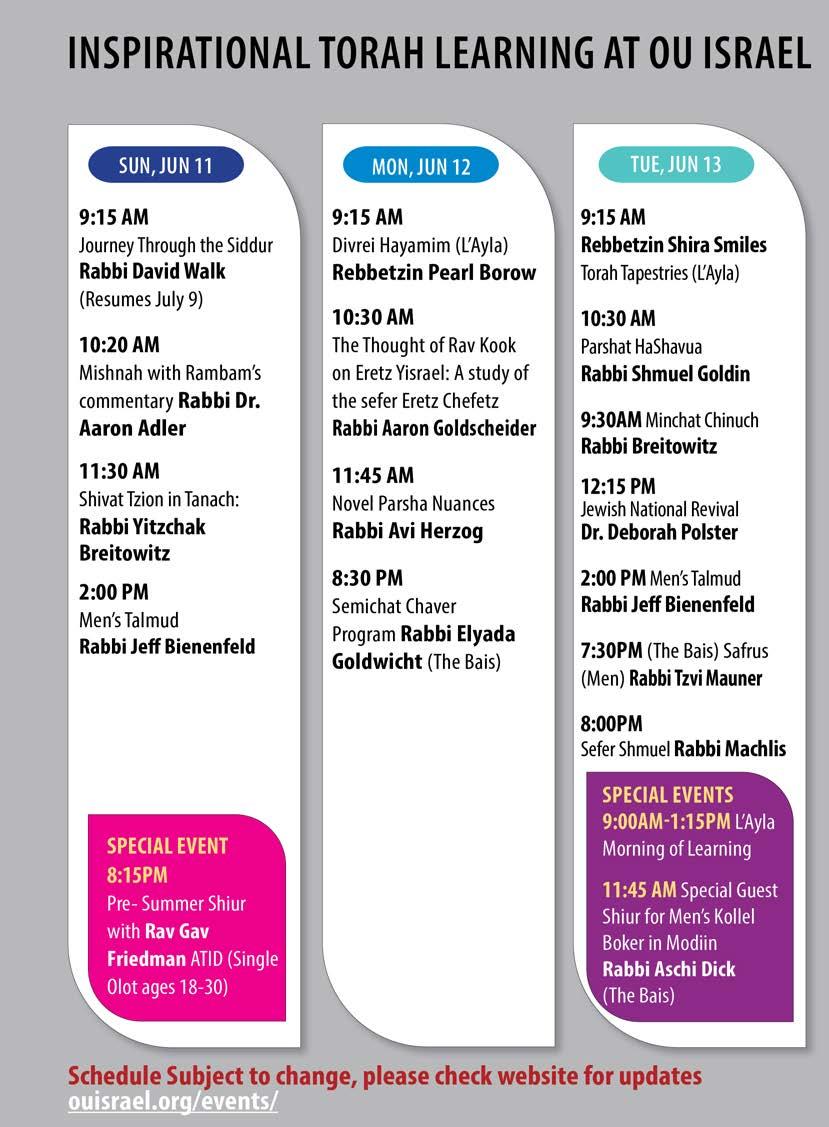
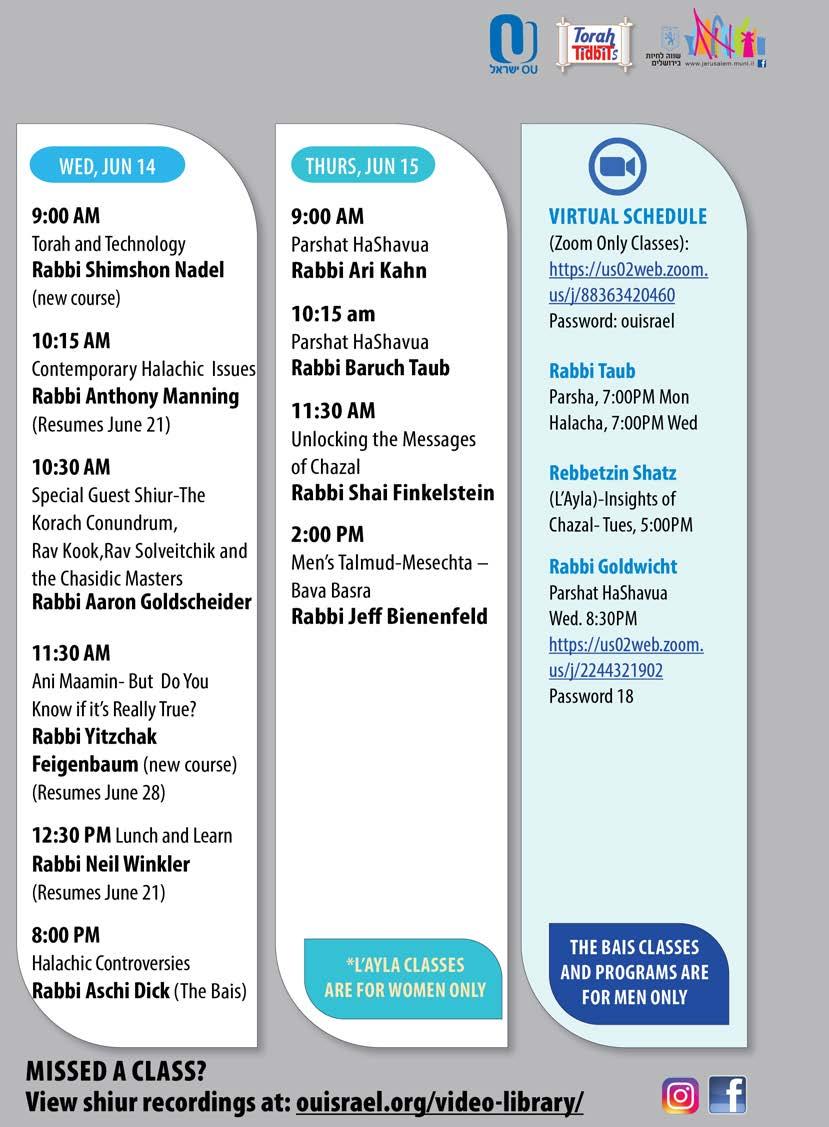
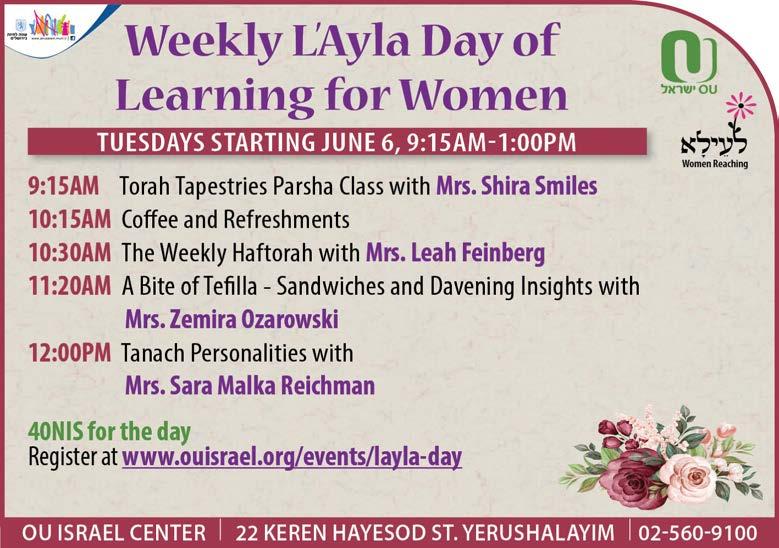


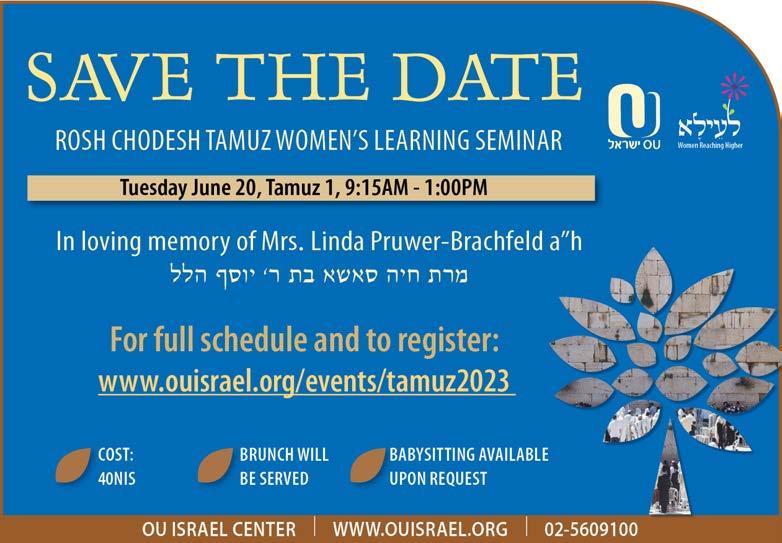


Sunday, June 4th - Rabbi Breitowitz’s shiur was sponsored by Gary & Laurel Schiff in honor of Rabbi Breitowitz’s teaching and the healing of our daughter-in-law Chaya Rachel bat Carmi Adina
Rabbi Goldscheider’s shiur has been sponsored for the 2023 Academic Year
ל’’ז המלש ןב בוט םשו ה’’ע םהרבא תב םירמ תמשנ וליעל
it is as if G-d “re-gives” the Jews the Torah and the Jews re-receive it. Each time we learn Torah we are able to discover something new about the exact same words. It’s like we were all at Mount Sinai when the Torah was given, meaning it is every Jews responsibility to follow the Torah as if it was given specifically to him.
Rebbetzin Shira Smiles shiur is sponsored for the 2023 academic year by Dr. & Mrs. Menachem Marcus in memory of their parents, Rose & Dr. Emanuel Marcus z”l -
ל”ז סוקרמ השמ ןב יכדרמו ריאמ ףסוי תב לזייר Rosi and Ernest Strauss z”l -
ל”ז סוארטש דוד ןב לאינדו םהרבא תב דומיל
Before receiving the Torah at Mount Sinai, there were some Israelites that, of their own accord, already kept the entire Torah. Since this is the case, why is this day so important?
Rabbi Breitowitz’s Tuesday Shiur - Minchat Chinuch is sponsored for the academic year 2023 by Rabbi Refoel & Sharon Auman in memory of their parents Edith & Reiner Auman z”l
ד”יה לאפר תב ה”ע רתסאו ל”ז קודצ ןב הנוי and their son Rabbi Shmuel Eliyahu Auman z”l
י”נ לאפר ברה ןב ל”ז והילא לאומש ברה
Rabbi Goldin’s shiur is sponsored for the 2023 academic year by Dr. & Mrs. Menachem Marcus in memory of beloved aunts Irma Haas a”h and Hilde Myer a”h
On the day of Matan Torah 2 things changed. Firstly the Jews gained a connection to Hashem. Hashem put his essence into the Torah so when he gave it to us both those that had and had not kept the Torah before were now keeping it because of this connection to Hashem’s essence.
Rabbi Manning’s shiur has been sponsored for the 2023 academic year
ל’’ז ןמלק ןב גילזו ה’’ע תידנרב תב הנרב תמשנ יוליעל Rabbi Taub’s weekly Thursday Parshat HaShavua Shiur is sponsored by The Jewish Legacy Foundation
Secondly, the Torah given at Mount Sinai is able to have an effect on the physical world whereas before Torah and mitzvot were considered strictly spiritual matters.
students see Hashem, even though he is hidden by the mask of nature and teaches us how to use our free will to bring Hashem into the physical world in whatever way we choose.
Walking down King George St. in Jerusalem and want a cold bottle of water? Come help yourself to a bottle at 52 King George.
In loving memory of Yoni’s wife
Tziporah a"h, a true Eishes Chayil, always full of chessed, kindness and laughter, and brought life and strength to so many people, that she touched! She was like Aron, who loved peace and pursued peace.
The OU’s Jewish Learning Initiative on Campus (JLIC) is creating and nurturing vibrant religious communities in Israel to support English-speaking college students and young professionals. JLIC Israel’s goals include: building a warm and welcoming Jewish community for students and young professionals; providing engaging and dynamic Jewish education; providing a sup portive home environment for Olim; providing resources for personal and religious growth, including personal mentoring, Aliyah support, religious guidance and leadership development. Current JLIC programs in Israel include: Reichman University - Herzliya; Bar Ilan University - Givat Shmuel; Tel Aviv University; Tel Aviv for Young Professionals; and Jerusalem. Contact: Rabbi Jonathan Shulman, Director of OU-JLIC in Israel shulmanj@ou.org
Yoni thanks Hashem for having the opportunity of having Tziporah in his life, to learn of her caring, patience and happiness, to overcome her challenges. May Tziporah's Neshama be a light onto the world, in a time of darkness, and may her Neshama shine to Gan Eden. Yoni misses Tziporah with tears in his eyes, as Hashem gave him a gift, a crown jewel, now he returns her to Hashem. With thanks and Toda. Love, Yoni
To help refill the supplysend tax deductible donations for Be’er Tziporah a"h Bottled Water Gemach to Chabad of RechaviaRabbi Yisroel Goldberg email
Director Hadassah Jacob 052-384-7230

Monday Evenings 7:00 - 9:00pm
The Talmud (Shabbat 88b) states that when the Jews heard G-D’s divine voice, they all died from its intensity and afterwards G-d brought them back to life. I think this emphasizes why Hashem cannot be openly present in this world. For if he was, the Jews’ free will would no longer be preserved and we would follow Hashem in everything. If his awe and will were so apparent, we would be com pelled to follow him without having a real choice.
JLIC at Tel Aviv University does amazing work in bringing Jews together and teach ing us all about the torah we received at Mount Sinai. JLIC, I believe, helps us
For Sale: Ben Maimon, 4 rooms, 113m, 2 bathrooms, porch, 1st floor, elevator, 6.2 million NIS
Rabbi@JerusalemChabad.org 02 800-1717
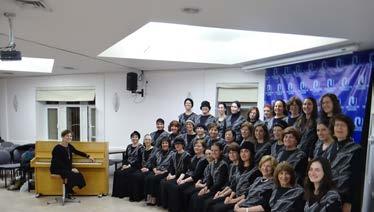
www.JerusalermChabad.org/DonateShekels
Smadar 050-3114040 // 02-642-4329
smadi_bida@walla.co.il
Monday mornings 10.30-12.30
For more details, call Ruth 02-628-7359 or Judy 054-569-0410




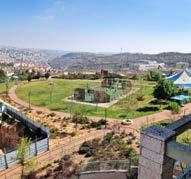
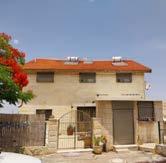








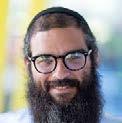
Rav Yerucham Levovitz, the legendary mashgiach of the Mir Yeshiva was a unique scion of the Mussar tradition of deep self-analysis, inner work and moral refinement. A close disciple of both the Alter of Slabodka, Reb Nosson Tzvi Finkel, as well as the Rav Simcha Zissel Ziv, the Alter of Kelm, he embodied the essence of Mussar. R’ Yerucham was renowned for his shmuessen, lectures which expressed his awe-inspiring intensity for spiritual elevation. Over four generations, hundreds of talmidim received guidance under the personal supervision of “the Mashgiach”. Many of these, in turn, became leaders and builders of Torah study across the globe.
One of Reb Yerucham’s great talmidim was Rav Mottel Rabinowitz, zt’l. After escaping with refugees from the Mir Yeshiva, and reaching Shanghai, Rav Mottel was imprisoned for more than three years in Japanese internment camp while attempting to make his way to the United States, braving disease and near starvation with mesirus nefesh. Ultimately, Reb Mottel dedicated himself to rebuilding Torah
and passing on the mesorah at Yeshivas Mercaz haTorah in Montreal, and became a beloved rebbe and role model for an entire generation of bnei Torah.
More than two decades ago, Rav Moshe Weinberger, shlit’a, met Reb Mottel, one of the last living great alter Mirrers, a title given to a person who had studied in the old Mir Yeshivah in Poland. Rav Weinberger asked the elderly talmid chacham: “Can you please share something about learning with Reb Yerucham? A ma’aseh, a story, maybe?
Reb Mottel demurred. “I’m not a chasid,” he said, “I don’t tell stories.” After a few silent moments, however, the elderly disciple of Reb Yerucham spoke:
“Did you ever see how pickles are made? Cucumbers are placed into a jar filled with water and brine, and after some time…they become pickled! I don’t know how, but after being in the presence of the Mashgiach, after a certain amount of time, I could not look at the world the same way. Something took place, like we were sealed in a jar and pickled. After that, no matter what, we can’t be the same way we were before….”
(The Meraglim, the ‘spies’ who were sent by Moshe to scout out Eretz Yisrael,) spread an evil report about the land which they
had scouted, telling Bnei Yisrael, “The land we passed through to explore is a land that consumes its inhabitants, and all the people we saw in it are men of stature!” (13:32)

Chazal understood that wherever the spies passed, the Canaanites were preoccupied with burials and mourning, and

intended this for good, so that the Canaanites would not notice the meraglim.” (Sotah, 35a)
Instead of recognizing, appreciating and reporting on this miraculous Divine kindness, the meraglim implied negativity and fear, saying that “the land devours its residents.” This dibat haAretz became the root cause of tremendous long-standing troubles for the whole nation.
Rebbe

(Likutei

attribute of Emet, truth in Yaakov. And above all, G-d valued their commitment to passing on these valued attributes to their descendants. That is why He ‘chose us from all the nations.’
example, if an animal consumes vegetation, such as grass, the grass, when it enters its stomach, they are transformed into the animal. The same applies from animal to human being; when a human consumes an animal, the animal is transformed into a human.
into the cells, blood, sinew and bones of our bodies, literally becoming part of us. ,
“a land that eats its inhabitants”. When a Jew comes to this “good Land”, we are devoured by its goodness, transformed, elevated and subsumed into its holy
Moreover, wherever the food that is divided among the limbs enters, it is literally transformed into the substance of that limb. For example, the part of the food that enters the brain is transformed into brain, and that which enters the heart is transformed into heart. The same is true of the other limbs.

Our chosenness has nothing to do with high intelligence. It has to do with Midot, character traits. At the end of the day, this is what we are all about. The central challenge to us is working on our personal Midot. The Vilna Gaon said that the reason we are here in this world is to improve a Midah, which we have thus far not perfected. Therefore, we must always work on this, for if we do not improve our Midot while we are here, what is the purpose of life? We must instill this concept in our children and grandchildren that bringing home a Report Card with all “A’s” on academic subjects will bring them a reward but getting all “A’s” on the Midot side will bring even a greater reward.
And this is the meaning of “A land that consumes its inhabitants”. “Land” corresponds to faith, as it is written (Psalms, 37:3), “Dwell in the Land and cultivate faith.”
Our physical presence and connection Artzeinu , satisfying its hunger for us, and as a miracle of Divine kindness, we reach higher and higher states of actualization and faith. We are not just affected and shaped by our surroundings; them. This is why, when we “go up” to the Land, something takes place in its presence, and “no matter what, we can’t be the same way we were before…”
And this is the implication in “consumes its inhabitants” — for when one enters the Land, which is the concept of faith, he is consumed by it — i.e., he is transformed into its substance.
We buy old sifrei kodesh, judaica gold, silver, coins, collectables, banknotes, antiques and more…
Rebbe Nachman explains that this transformation takes place through cleaving to a righteous person — being in the close presence of tzadik and believing in their power. One is ‘pickled’ in the tzadik’s presence, ‘consumed’ and transformed into their substance.
• Curtains & draperies
• Designer curtains
• Venetian & Woven wood blinds

• Blackout, Vertical, Roller, Roman & Pleated shades

Ran: 054-5561223

When we eat, the food nourishes us and is transformed and elevated, absorbed
www.ashleywilde.co.il


THIS WEEK: Thanks to those who responded last week. We now have another second hand fridge available for a needy family. Please be in touchand continue to support our crucial work.
• Checks: Make out to “Yesh Ezra”
Send to: Yesh Ezra, POB 31476, Romema, Jerusalem, 9136101

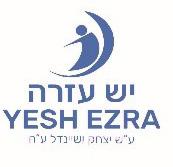
• Bank Transfer: Bank Mercantile (17), Branch 642, A/C 79747843, Yesh Ezra
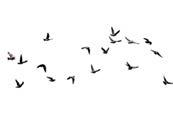
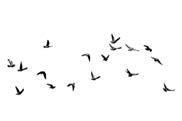

To obtain your tax benefit receipt, send details by Whatsapp/email.
• Credit card: Sara at 077-820-0196
Sunday, Monday, and Wednesday (10:15am - 2:45pm)
• Website: www.yeshezra.org Click on “Donate Now”
Inquiries:
Menachem Persoff 050-570-1067 menpmp@gmail.com

FOR SALE IN JERUSALEM:
German Colony (Klein) - 3 extremely large rooms in an Arab-style home, high ceilings, arched windows, colored floor tiles, quiet. Exclusive! Moshe: 053 6305725
On a recent Sunday afternoon, just after 4 P.M., a 96-yearold woman experienced cardiac arrest in her house on Tzemach HaSadeh Street in Maale Adumim. Worried family members immediately called for medical assistance.
On a recent Tuesday morning in Jerusalem, parents were feeding their 6-month-old baby and introduced him to tahini for the first time. Within minutes, the baby developed a severe allergic reaction. The infant's parents immediately called emergency services, seeking urgent help.
Avi Becker, a volunteer EMT with United Hatzalah, was home when he received a proximity alert, notifying him about the emergency occurring not far from his location. Without hesitation, Becker quickly mounted his ambucycle and raced to the scene, arriving in under 30 seconds. Upon his arrival, he discovered the woman lying on the floor, unresponsive and with no pulse.

United Hatzalah volunteer EMT Shalom Klein, alerted to the emergency through his proximity alert system, sprang into action as the first responder on the scene. Arriving promptly, Shalom was confronted with a distressing sight - a baby boy with swollen lips and tongue, struggling to breathe, and covered in a worrisome rash.

The volunteer promptly initiated CPR, delivering chest compressions to the woman. A few minutes later, an intensive care ambulance arrived at the scene to assist in the resuscitation efforts. After a collective effort of several minutes, the woman’s pulse was successfully restored.
Kiryat HaLeom "Foreign Ministry Quarter" 2 rooms, Brand New! Spacious (easily dividable into 3 rooms) - gorgeous balcony, private parking, storage room, Shabbat elevator, minutes walk from Machane Yehuda market, Cinema City, Binyanei Hauma, the Supreme Court and the Government, the Hebrew University, speed train to the Airport, Tel Aviv and beyond. Exclusive! Jehezkel: 053-7664505
Baka (Rivka) - 3 rooms, fully renovated, entrance level, 2 balconies, 2 separate entrances Can be divided: made into clinic/ separate unit. Exclusive! Anita: 053-6318355
While this was transpiring, Becker received a second alert regarding a traffic accident near the Adumim Interchange. Recognizing that there were enough first responders present to continue the treatment and transport the woman to the hospital, the volunteer swiftly left the first emergency scene on his ambucycle and hastened to the location of the second incident. Within minutes, he arrived to find two motorcyclists who had sustained apparent hand fractures. Becker immediately provided initial treatment, applying bandages to the wounds and immobilizing their limbs.
Recognizing the symptoms as indicative of an anaphylactic shock, the volunteer knew immediate intervention was crucial. Without hesitation, he administered a life-saving EpiPen injection, delivering a dose of epinephrine to counteract the severe allergic reaction. The powerful medication quickly took effect, and the infant's breathing became less labored. The swelling in the lips and tongue began to subside, providing much-needed relief to the child.
As the symptoms continued to recede, the EMT monitored his condition while awaiting the arrival of a mobile intensive care ambulance. Several minutes later, the ambulance team arrived and transported the infant to the nearest hospital for further treatment and observation.
Reflecting on the sequence of events, Becker said: “I have been an EMT with United Hatzalah for over 10 years, and I have always had a profound passion for the medical field and a deep desire to help others. The sense of mission and the immense satisfaction derived from assisting people in need are truly remarkable. I am grateful that I could utilize my day to perform acts of kindness.”
Reflecting on the incident, Shalom emphasized the importance of having an EpiPen readily available. "It's a great thing I had an EpiPen in my medical kit," he stated. "An EpiPen can save a person's life within minutes and is a huge help for both EMTs and patients."


Premium delicious shabbes meals



Openning hours:


Thursday 12 pm-2 am
Friday 8 am-3 pm

Our Sedra this week, Parshat Shelach, recalls the challenging episode of the Meraglim, whom Moshe Rabbeinu sent forth to scout out the Land of Israel.
In his instructions to the Meraglim, Moshe Rabbeinu spells out the details he is seeking from the Meraglim in their assessment of Eretz Yisrael.
"
Uma HaAretz HaShmeina hi im Raza, hayeish ba Eitz im ayin, vehitchazaktem ulekachtem mipri haaretz..."
And what of the Land- is it fertile or is it lean, are there trees there or not, you shall strengthen yourselves and take from the fruit of the Land...
Rabbi Shlomo Zalman Horowitz, the Patiker Rav zt'l, in Sefer Beit Aharon points out that at first glance it seems that Moshe Rabbeinu is suggesting to the Meraglim that he is seeking a report on the physical situation in the Land, and seemingly their report accurately addresses that assignment.
However, in his advice to eat of the fruits of the Land so that "you may be strengthened", Moshe is actually communicating that by imbibing the fruits which grew in the sacred soil of Eretz Yisrael, the Meraglim would be strengthened spiritually, and be able to see beyond the physical challenges and see the amazing potential and beauty inherent in the Land of Israel.
The Chidushei HaRim, the first Gerrer
Rebbe zy'a actually points to the phrase HaYeish bo Eitz im Ayin- usually translated to mean are there trees, forests there or not, as holding the clue to Moshe's actual instruction to the Meraglim.
Said the Chidushei HaRIm-HaYeish bo EitzDo you perceive the Eitz HaChaim- do you feel the Torah's wisdom pulsating through the very environment of Eretz Yisrael?
Rabbi Gedalya Schorr zt'l in his masterpiece Ohr Gedalyahu explains that since the Meraglim misunderstood Moshe's goal in sending them to scout out the Land, and thus the Meraglim were solely focused on the physical reality on the ground, they misunderstood that the Eitz - Moshe was referring to was actually the Eitz HaChaim that is the Torah HaKedosha.
Chazal in the Gemara in Bava Batra teach: Avira D'Eretz Yisrael Machkim- the very atmosphere of the Land of Israel breeds wisdom and clarity. So too, explained the Chidushei HaRim, Moshe hoped to convey to the Meraglim that in addition to what they might find as the situation on the ground, when one comes to Eretz Yisrael, we have the potential to perceive a much greater reality than that which we simply see before us.
May each of us merit to indeed feel that clarity, and experience the spiritual wisdom and palpable heightened awareness that is inherent in the very atmosphere of our sacred Land....
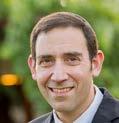
The disastrous fiasco of the meraglim was a complete moral and theological breakdown. As the intelligence reports about Israel began to stream in, it was obvious that the Land of Hashem would not be easily conquered. The cities were highly fortified and the fearsome inhabitants were unconquerable. Not only that, but our old nemesis, Amalek, was stationed to the south of the country, waiting in the reeds, ready to pounce on us as soon as we entered the Land. Terrified by these chilling accounts, we lost faith in Hashem and in His ability to vanquish these giants. At the first hint of adversity we unraveled, descended into full scale panic, and failed history. Everything fell apart so quickly and so easily. Our cowardly tears and our babyish sniveling condemned this day of Tisha Be'av to infamy.
Having fueled anxieties about the mighty inhabitants of Israel, the mergalim transitioned into the second stage of their mutiny, vilifying the actual Land itself.
ץראה תבד ואיצויו . They cast Israel as a Land which consumed its inhabitants. As they scouted the Land, they had repeatedly
witnessed funeral processions. The midrash comments that Hashem raised the local death rate diverting attention away from the secret mission of the meraglim. Noticing these high mortality rates, and the recurrent funerals, the spies assumed the worst- there was something toxic and lethal about the Land itself. It appeared to gobble up its citizens.
There was also something bizarre about the people they met. They had mutated into freakish giants. Evidently, this Land, supposedly famous for flowing with milk and honey, instead, oozed with toxins and venom. Not satisfied with fomenting public opinion against Hashem, the meraglim whipped up fears about a poisonous and contaminated Land.
They should have known better and should have learned their lesson from Miriam's hideous punishment for her slanderous libel against Moshe. The final chapter of Beha'alotecha, which immediately precedes the meraglim story in Shelach, records the slurring of Moshe by his own siblings. For her part in the besmirching of Moshe, Miriam was afflicted with repulsive tzara’at. Chazal remark that the meraglim should have realized the corrosive effects of slander and
should have spoken more complimentary about the Land of Israel.
Obviously, the Land of Israel isn’t animate and wasn’t personally insulted by the derogatory comments of the meraglim. The meraglim’s libel of Israel disgraced Hashem’s gift to our people. Hashem’s decisions and actions are often mysterious, but the Land of Israel is not. It is an unmistakable divine gift, and failure to appreciate that gift is a glaring deficiency of faith. Defaming the Land didn’t insult the Land, but it certainly did scorn Hashem who delivered us this sacred ground.
The gemara in Ketuvot showcases Amoraim who either caressed the rocks of Israel or rolled in her dust, as a display of affection. To demonstrate his own devotion to the Land, Rebbe Chanina would remove boulders or any other natural barriers which obstructed the roadways, so that future travelers would not trip and would not vent their frustration upon the Land. For their part, Rav Ami and Rav Asi assiduously practiced "climate control" in Israel, so that their experience would be more pleasurable. They were scrupulous about receiving sufficient sunlight in the winter and not overheating in the summer so that their pleasant living conditions would elicit favorable associations with the Land. Awarding us His Land, Hashem expects us to settle it, but also, to compliment it, and certainly not to slander it.
There is an additional parallel between Miriam’s mistake and the blunder of the meraglim. The Torah doesn’t describe the content of Miriams slur against
SHABBATTO scooter offers a "Mehudar" Zomet-approved Shabbat mechanism that operates according to the "Existing Current Modulation" principle. The Shabbat mechanism is pre-installed and does not require expensive fitting.




is reluctant to send Yishmael away and Yitzchak seeks reconciliation with Yishmael and seeks to bless Esav.
Moshe, but Chazal fill in the blanks: she questioned Moshe's decision to abstain from normal marital relations with his wife. Miriam didn’t fully appreciate the special circumstances surrounding Moshe's irregular decision. Moshe adopted his unorthodox lifestyle to preserve a constant state of readiness to speak with the shechinah. His atypical behavior was tied to something deeperthe presence of Hashem in his life and in his tent. Miriam was unable to trace Moshe’s behavior to this augmented presence of Hashem.
6th Aliya (25:1-11) Avraham marries Keturah; they have 6 sons. All that Avraham has goes to Yitzchak; these are sent eastward with gifts. Avraham dies at age 175; he is buried by Yitzchak and Yishmael in Ma’arat Hamachpelah. Yitzchak is blessed by G-d: he lives in Beer L’chai Roi. The transition from Avraham to Yitzchak is complete. While G-d has been a silent partner in this parsha, here He completes the generational transfer – He blesses Yitzchak. The Jewish people will be Yitzchak and not Yishmael.
7th Aliya (25:12-18) The generations of Yishmael are enumerated. Yishmael dies. His descendants dwell from Egypt to Assyria. Yishmael’s story is brief. He has numerous and powerful offspring. The brevity
Similarly, the meraglim weren’t able to associate their own findings about the Land with the presence of Hashem in this supernatural territory. Witnessing the mammoth sized fruits and enormous inhabitants, they should have traced these irregularities to the presence of Hashem. The Land devoured its inhabitants precisely because it was Hashem’s domain and life before G-d can be harsh. Miriam was unable to trace Moshe’s conduct to the intensified presence of the Shechinah, and, similarly, the meraglim were unable to look "behind the curtain" and identify their strange findings as reflective of a deeper divine essence lying beneath the surface.
and complaints or they can be regarded as signs of Hashem’s intense presence in this Land. Until redemption concludes life in this Land will not be easy.
is to emphasize that the Torah is not as interested in the history of power as in the history of the covenant of G-d with the Jewish people. And that will be told at great length.
The theme of this week’s haftorah echoes the theme in our parsha which mentions both the death of Sarah and Avraham.
2500 years ago, Ezra and Nechemiah led us back to Israel from our first exile. Sadly, only 42,000 Jews returned, while the rest remained comfortably nestled in exile. In his comments to Kiddushin, Rashi itemizes the two deterrents to mass aliyah: economic conditions were challenging, and additionally, the Jews faced local violence. The more things change the more they remain the same.
King David was an older man and a woman was assigned to him to serve him and provide warmth.
Adoniyahu, one of King David’s sons, began to prepare for ascension to his father’s throne. This was despite the fact that King David expressed his wishes that his son Shlomo succeed him.
Adoniyahu convinces two very significant personalities - the High Priest and the commander of King David’s armies - to
BY RABBI CHANOCH YERES Rav, Beit Knesset Beit Yisrael, Yemin MosheWhen Avraham addresses the people of Cheit, trying to acquire a burial spot for his wife, he says “Ger V’Toshav Anochi Eimachem” (23:4) “A Stranger and a Resident am I with you”
This seems to be a contradiction. If one is a stranger than he is not a resident, if he is a resident than he is no longer a stranger. What did Avraham mean?
Our precarious security situation in Israel was, and always will be, a function of this Land’s historical resonance. Subconsciously, the entire world recognizes that this is where history began, and this is where it will end. It is only natural that our presence in this Land be hotly contested. Likewise, financial success, living under the eye of Hashem will never be as straightforward and trouble-free as it may be elsewhere. Hardships in Israel can either evoke disdain and disparagement or they can be contextualized as part of the privilege of living before Hashem. Complaining about life in Israel aggravates the sin of the spies. Celebrating life in Israel, despite its hardships, partially rectifies their historical sin.
The Magid of Dubno (Jacob ben Wolf Kranz 1741-1804) explains that Avraham watched how he spoke in this tense situation in order to, both, state his truth and be able to keep the peace -Shalom Bayit. Avraham said, on the one hand, “I am a Resident’ due to G-d’s promise to receive this Land and on the other hand, I still need your agreement to purchase a plot. In other words, Avraham implied “I am the resident” and you are the “strangers”, while they understood him as saying that “they” are the residents and Avraham is the stranger. The peace was kept, and Avraham remained true to his ideals.
Shabbat Shalom
Life in Israel always carries added complications and severe challenges. These adversities can either elicit scorn
We are a young senior couple looking for a 1 bedroom furnished apartment in Jerusalem from December 2021-June 2022

0524419731
Even the internal social tensions which sometimes rile us in Israel are, ultimately, related to its being the Land of Hashem which was selected for the people of Hashem. We were chosen by Hashem precisely because we are obstinate, and we were capable of withstanding
the formidable challenges of exile. Just because we have returned home, doesn’t mean we have become any less stubborn or have softened our personalities. We are still determined and headstrong and we are often quite loud about it. We tenaciously and vociferously defend our beliefs and our values. Stiff necked people of God arguing about their collective future in the Land of God is a recipe for shrill arguments and for noisy quarrels. Everything in the Land of Hashem is magnified- even arguments.

Moving to Israel takes courage and vision and not everyone has seized the historical opportunity. At this stage of history many have chosen the right to live outside our Homeland. However, no one has the right to scorn our Land by excessively grumbling about the challenges of living in Israel. Conditions in Israel, especially when they are difficult, are symptomatic of it being the Land of Hashem. Griping about these conditions mocks Hashem's gift to His people and ignores His presence in His Land. No one has a right to scorn our Motherland. We learned this lesson the hard way, thousands of years ago in a contentious desert, at a very high historical cost.

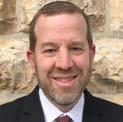
The aspiration of Israel for building the nation, for return to the Land, is an aspiration of the depth of good that penetrates to the roots of all existence. Not the “upraising of a brick” of some structure but rather a whole, in-depth turning to the foundation of the entire structure to establish it correctly. Not a few trees or branches of the Tree of Life and Good but rather exposing the source, the spring of life from which is fed the sap of the Tree of Life, with all its roots, trunk and branches, trailers and leaves. From it will come a spirit of life, a new spirit, a new world will be built. (Eretz Chefetz 5:2) (Naor translation)
In the above passage Rav Kook explains that the desire to return to Israel represents something much more grand than merely fulfilling the mitzvah of living in the Land. The return to the Land of Israel is nothing less than an undertaking that “from it will
come a spirit of life, new spirit, a new world will be built.” In a word, yishuv Eretz Yisrael is an attempt to attain the loftiest goals which will transform mankind.
Why is Eretz Yisrael essential in the process of tikun olam?
To answer this question let us examine the incisive comments of the Vilna Gaon on an obscure passage in the Talmud. In a section known as ‘the Rabba bar Bar-Chana teachings’ ( Bava Batra 73a), we find the following story:
“Said Rabba bar Bar-Chana: Those who go down to the sea have told me that the wave that sinks a ship seems to have a fringe of white fire at its tip, but that when one strikes it with a club engraved with the name of God “Eheye asher eheye Hashem tzeva-ot” and with Amen, Amen, Selah it does down” (Bava Batra 73a).
The Vilna Gaon interprets the passage as an allegory. The ship in the wavy sea represents man’s passage through life as well as our story as a nation over the many centuries. There are many treacherous hurdles along the way. One major challenge is the yetzer hara which competes with man’s will to be virtuous and do the right thing. The “white fire at its tip” represents the white hot passion that the yetzer hara inflicts upon the psyche. Additionally, says the Gaon, the white fire is symbolic of the yetzer hara garbed in white and convinces the heart of the sinner that it is an act that is pure and justified.
The surrounding society poses a threat that evil may swamp man and hinders the Jew from carrying out his mission on earth.
As long as the people of Israel were able to function freely in their own Holy Land, the battle against evil could be won. But when we become “enslaved by the nations” in exile it is nearly impossible to remain influenced by self-serving or materialistic motives.
It seems that our journey across the sea of life is doomed: “the wave tipped with white fire” is sure to sink our ship. What hope is there for the Jewish people? What assurance is there that evil will not totally overcome and destroy the world?
Rabba in his allegory is teaching that the overwhelming tide can be effectively subdued with a club engraved with names and words which signify God’s promise that evil will not engulf the world and that the ultimate goal - to bestow goodness upon man - will surely be realized.
The first Name engraved on the club which beats back the wave is, therefore, Eheye asher eheye, which signifies that God accompanies His people whenever they are enslaved by other nations. God supplies them with the spiritual nourishment to survive the exile with their souls intact.
The Talmud (Berachot 9b) comments on this Name of God to mean: “[With these words] God said to Moshe: “Tell the Jewish people that I shall be with them in this
enslavement and I shall be with them in future enslavements.”
The second name on the staff expresses the notion that God has taken an oath to redeem the Jewish people from the Exile. This is expressed by the Name yud-heh, particularly in the following verse of the Torah: For God (yud-heh) has sworn by his throne that there will be a war between Him and Amalek throughout all generations (Shemot 17:16).
The tetragrammaton (the complete fourletter Name of God) represents the total revelation of God’s ways to mankind. The image of “God sitting in His throne” presents total recognition of mankind as Ruler of all. Amalek is the embodiment, in the national form, of evil. It is the single nation which went to war against the Jewish people to keep them from receiving the Torah at Sinai and which throughout history attempted to annihilate them.
In the verse both the Name of God, (yud -heh) and the word or throne (kes) appear in their incomplete form. The four-letter Name represents total revelation of God to man.
The Jewish nation is the agency by which all mankind will someday recognize God. Since universal recognition of God depends on the Jewish people, their exile is what has “made the Divine name incomplete,” and only when they have returned form the Exile and the Temple has been rebuilt can the other two letters of God’s Name be added and knowledge of God be manifest in the world.
The name of God, Hashem Tzeva-ot, does not appear in the Torah. It does appear, however, numerous times throughout
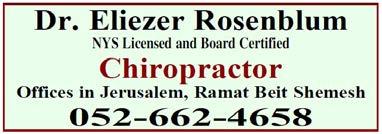
came to understand the reality of what it means to be a Yid, that there is such a force as Amalek and a price-tag to chosenness.
Tanach within the prophecies of the neviim. Noteworthy is the verse in Psalms 24 which we recite regularly: “Who is the King of glory? It is the Lord, strong and mighty, the Lord mighty in battle. Lift up your heads, O gates, be uplifted, eternal doors, that the King of glory may enter. Who is the King of Glory? The Lord of hosts (Hashem Tzeva-ot), He is the King of glory, Selah!”
in who we are, and with joy and faith in our purpose in this world.
Amen, Amen, Selah
Anti-semitism in fact serves as a reminder of who we are, that we are indeed different from all other nations. When we are singled out, we are stimulated to question what it is that sets us apart. And this gives us the opportunity to reassert our commitment to the spiritual and international obligations we carry.
Rav Joseph Soloveitchik maintained that those who sow hatred of Am Yisrael in the world are the disciples and ideological descendants in the spiritual lineage of Amalek. Today, the dramatic surge in antisemitism worldwide makes Shabbos Zachor all the more relevant:
The Vilna Gaon interprets this word - tzevaot - to refer to the nation of Israel who serves as the army (tzavah) or legions who carry out the war against God’s enemies. God’s glorious kingdom will be recognized by all mankind when His army has succeeded in its mission.
Apparently this is the meaning of the law codified in the Rambam (Hilchot Melachim 1:1): “Israel was commanded three mitzvot upon entering the Promised Land, to choose a king…to wipe out the descendant of Amalek…to build God’s Chosen House.”
“Hashem is at war with Amalek from generation to generation.” (Shemos, 17:16).
“Amen” is engraved on the club as a symbol of accepting the authority of God and carrying out His will. Amen is an answer to a blessing. We say Amen with anticipation. We affirm with this one word that blessing will eventually be actualized and experienced as a reality to all mankind.
Mordechai lo yichra, lo yishtachaveh, “Mordechai did not kneel and did not bow” to anti-Jewish powers. Rather he stood tall in joyful defiance, unabashed of his Yiddishkeit, and unafraid to display religious symbols and behaviors, even in a time of great physical threat.

With the return to Eretz Yisrael, we will finally be in a position to defeat Amalek. With this victory the Temple can serve a lighthouse for the world as a source of inspiration and for God’s truth to become manifest.
With this in mind we can now turn to the final words written on the “club”:
There is sweetness in being empowered as active partners with the Ribbono Shel Olam, and knowing that we are not alone. Whether it emanates from the ideological Right, the ‘woke’ political Left or the politicians in the United Nations — or whether it is expressed on social media or even on the streets of our own Homeland — we can stand tall in the face of our enemies’ derision and hate. We can stand with our people, with holy pride
Parshas Zachor thus prepares us for Simchas Purim, when kimu v’kiblu haYehudim, when the Jews established and accepted their historical mission. We, too, are prepared to reassert our desire to live with Torah, as well as our willingness to make sacrifices in maintaining our Jewish identity. It is this desire and willingness that becomes a source of celebration and joy on Purim — and every day. Perhaps this year, while distributing d’mei Purim, we ought to flip a coin or two to all the haters out there, and thank them for helping us to remember…
The Vilna Gaon’s elucidation of the obscure talmudic passage offers us a vision of the foundational and resplendent features of the Jewish view for the future. The long exile presented our nation with monumental challenges to our spirituality and to our very existence. We were limited in our ability to achieve all of our aspirations in that scenario. The nation of Israel returning to her Land puts the Jew in position to eradicate the evil in the world and to spread the word of God to mankind.
Rav Kook envisioned the modern day return to Israel as an integral step in the path towards the ultimate destination for all humankind.
The story is told that Montefiore was once at a dinner party, seated next to a known anti-Semite. This man told Montefiore that he had just returned from a trip to a distant country “where they have neither pigs nor Jews”. Montefiore quipped: “In that case, you and I should go there together…so it will have a sample of each!”

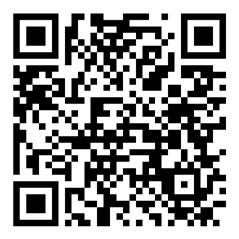

In Shemonah Esrei, we express our deep feelings of thanksgiving daily with the words ונויק םלועמ ךדסח ומת אל יכ - םחרמהו ךל And the compassionate one, For your kindnesses have never ended, always have we put our hope in You. The word k’vinu in this phrase is related to a word in this week’s Haftorah, ינָשַּׁה טוּח תוְקִתּ a length of crimson cord (Yehoshua, 2:18). The root of the word תַוְקִתּ, length can be traced to the word kav line as expressed by the posuk in Yeshayahu וק עטנ םיצע שרח, the woodworker stretches a line. Interestingly, kav is also the same shoresh (root word) for the word tikvah (hope). What is the relationship between kav - line, length, and hope?
A dot is a single point of focused attention that provides a reference point. While dots are about marking out a fixed position, a line leads somewhere, your eyes seeking one or both of its endpoints. This movement and direction makes lines inherently dynamic. When you connect lines, you create something tangible with dimension and depth.
A person is like a dot, set at a particular time and place. But as a person engages with others, lines are formed and the
elements of movement and direction are added. There is a sense of before and after. Finally when connecting these lines, a person has the ability to create, build and leave their mark on this world.
When Rachav was told to put a length of crimson cord out her window, she was affirming her allegiance to the two spies and to the Jewish nation. Her relationship was based on the risk she took for the Jewish people and the trust the spies put in her when they visited her home. Ultimately, it was this connection that saved her life as well as determined the military success of the battle of Yericho and of future battles.
It is the relationships we make with each other that give us hope and ultimately gratitude for connections and close ties. In times where we may feel disconnected from each other, let us take a moment to reach out and express appreciation and recognition in an effort to create hope for a better future.
For Sale: Ben Maimon, 4 rooms, 113m, 2 bathrooms, porch, 1st floor, elevator, 6.2 million NIS


Smadar 050-3114040 // 02-642-4329


smadi_bida@walla.co.il


Hometown: Los Altos, CA
Hometown: New Rochelle, NY
Community:
Community:
JLIC Jerusalem
JLIC Jerusalem
I am currently a student at the Hebrew University of Jerusalem studying Biomedical Science.
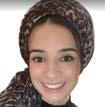

When the spies deliver a scathing review of the Land, Bnei Yisrael erupt with slander and cries. After they murmur to one another ויחא לא שיא ורמאיו, saying, “let us appoint a new leader and return to Egypt,” Moshe and Aharon fall on their faces in front of their people (14:4-5). They are once again let down by the nation that can neither muster faith in them nor in God.
The Midrash calls sefer Vayikra “Torat HaKohanim”, the Law of the Kohanim. It is the Kohen who brings korbanot and is active in the daily functioning of the Mishkan and Beit Hamikdash. This all amounts to a common theme of the Kohen handling activities of purification. In Parashat Tazria, however, we see that the Kohen is responsible for the entire process of tzaraat, starting from the diagnosis and declaration of impurity throughout the purification process. While the Kohen’s role in purification is clear, his role in pointing out the impurities in the metzora is peculiar.
The Ramban, in his commentary on Vayikra 13:2, explains that the Kohen’s role in diagnosing the metzora is a preventative measure aimed at protecting the community from
In contrast, Yehoshua and Kalev, the only spies who defended the Land, react entirely differently. They rent their garments – וערק םהידגב תא (v. 6). However, it is unclear exactly why they tore their clothing. If they are mourning, this seems premature. God has not yet issued a punishment and this is certainly not the first time Bnei Yisrael has complained. What, then, were Yehoshua and Kalev expressing through this action?
It happens to be that this language only appears in one other story in the Torah. There too, a brave individual stands up against a mob of angry brethren, and tears
harm. Tzaraat is known to be a highly contagious affliction, and the Kohen must diagnose it quickly in order to prevent it from spreading to others.
On the other hand, in Masechet Arkhin (15b), it states that the Kohen who diagnoses tzaraat is actually performing a mitzvah, as it says in Vayikra 14:2, “This shall be the law (הרות) of the metzora on the day of his purification”. The Talmud explains that the word “torah” in this passuk can also mean “teaching” or “instruction,” and thus the Kohen’s role in diagnosing tzaraat is really providing instruction to the person on how to improve themselves and become pure again.
his clothes, וידגב תא ערקיו (Gen. 37:29). The sons of Yaakov, boiling with frustration, also murmur to each other – ויחא לא שיא ורמאיו (Gen. 37:19). They develop a devious plot to kill their brother, Yosef, and throw him in a pit to cover their tracks. Reuven the eldest, stands caught between knowing what is right and empathizing with his brothers’ resentment. Hoping he can reconcile this tension, he concedes that they may throw Yosef in a pit, but they may not harm him. Later that day, when Reuven privately returns to retrieve him, he is dismayed to find the pit empty. Realizing that he has done too little and too late, he tears his דגב. Rav Hirsch suggests that דגב is associated with the word דגוב, betray. When tearing one’s clothing, one represents a disparity between one’s intentions and reality.
The Sfat Emet on this parsha similarly suggests that the Kohen’s role in the tzaraat process is not merely to identify the problem but to offer an opportunity for self-reflection and growth. The Kohen helps individuals recognize their weaknesses and enables them to grow and improve. This concept is also discussed in Mishna Avot chapter 6, where it states that true gratitude is acquired through the attribute of “Ohev Et HaTochechot”loving rebuke. This means that individuals should not deny their faults but should recognize them as an opportunity for growth and development.
Yehoshua and Kalev similarly tear their clothing, standing at a point of tension, trying to reconcile loyalty to Hashem with sympathy for their fellows. Just as Reuven stood among his brothers, understanding the pain behind the words spoken לא שיא ויחא – Yehoshua and Kalev are םירתה ןמ (Num. 14:6), among the spies and part of the nation. They understand the fear of their brothers. But at the same time they recognize their responsibility to Hashem and the Land. They tear their clothes at the moment when they confront this reality. They appeal to Bnei Yisrael by referencing
donated by Marion & Michael Silman Ita Rochel 02-560-9125


the kindest words of the spies’ report, that the Land is שבדו בלח תבז, flowing with milk and honey, but unlike Reuven, they fearlessly speak out against their fellows in defense of what is true. Although they were unsuccessful at rectifying this situation, it is this leadership that earned them the privilege to lead a new generation, 40 years later, into the Land that is דואמ בוט.








 Ian Schwartz
Ian Schwartz

This week’s parsha addresses the challenges and responsibilities of leadership. We see that Am Israel complain about their hardships. First, generally as an unspecified complaint (ג-א א"י קרפ(, but then a more specific complaint that seems somewhat absurd: “The rabble with them began to crave other food, and again the Israelites started wailing and said, “If only we had meat to eat! We remember the fish we ate in Egypt at no cost” (ה-ד א"י קרפ(.
Am Israel seems to have forgotten that in Egypt they had been slaves, and that they had cried out to be freed by God. There was something so horrible about this behavior that it induced Moshe into a breakdown, as he turns to Hashem and says that he cannot carry the weight of the people on his own.
Hashem responds by instructing Moshe to gather seventy elders to share the leadership burden with him. We learn from this about leadership and the importance of collaboration. Moshe recognizes that he cannot bear the weight of leadership alone and seeks assistance.
The Rambam, in הרות הנשמ, reflects on the qualities of a good leader. He writes in Hilchot Melachim (ו:ב(: “A king should be of great stature and the most outstanding in his generation, surpassing all others in his
wisdom and understanding. He should be gentle and lowly of spirit, for the higher a person rises, the humbler he should become.”
From the Rambam’s words, we learn that leadership is not about wielding power but about humility and wisdom. A true leader should prioritize the wellbeing of his people and show compassion and understanding.
The selection of the seventy elders also highlights the significance of shared responsibility within a community. This teaches us that true leadership is about serving the people and seeking their collective welfare.

In this week’s parsha we begin reading about the instructions for the lighting of the menorah in the mishkan. The menorah represents the divine light, symbolizing the presence of God among the nation. The act of lighting the menorah is a reminder that each person has the potential to bring light and holiness into the world. It teaches us that leadership is not just the responsibility of a chosen few but is a calling for all individuals.
Later on in the parsha, we encounter the nation complaining about how they are tired of eating manna and want to eat meat. Moshe rabbenu gets very overwhelmed by the people’s complaints and asks Hashem for help. Hashem then instructs Moshe
to gather seventy elders to share the burden of leadership. This act highlights the importance of delegating responsibility and recognizing the unique strengths and abilities of others.

We also witness the pivotal moment when Miriam is afflicted with tzaraat as a result of speaking lashon hara about her brother. This incident teaches us about the destructive power of gossip and the necessity of cultivating a community rooted in love, respect, and positive communication.
As we study this week’s parsha we should be inspired to embrace our own leadership potential and to cultivate an environment of unity, respect, and kindness within our communities. May we strive to be sources of light, bringing holiness and positivity into the world, and may we recognize the inherent value and power of each individual in the pursuit of a better and more harmonious society.
We can learn a lot about ourselves from this week’s parsha and it should be a mirror to look into and reflect from and see how we ourselves can contribute to our own communities. We should be open and willing to better ourselves as a person to better our surroundings and bring a more positive light into the world.

